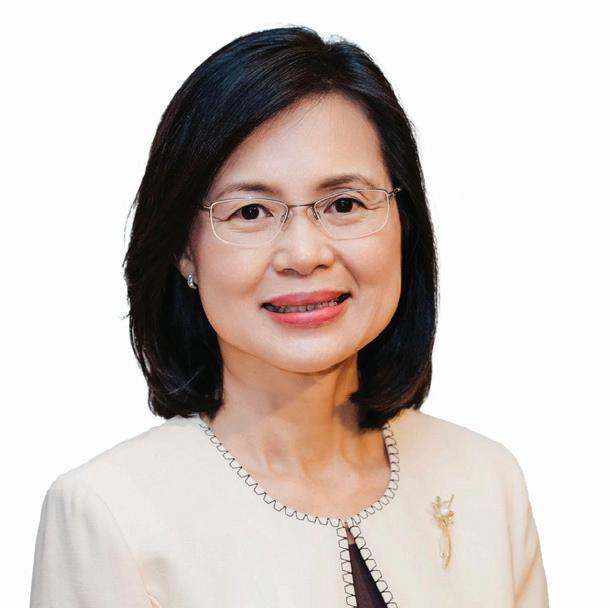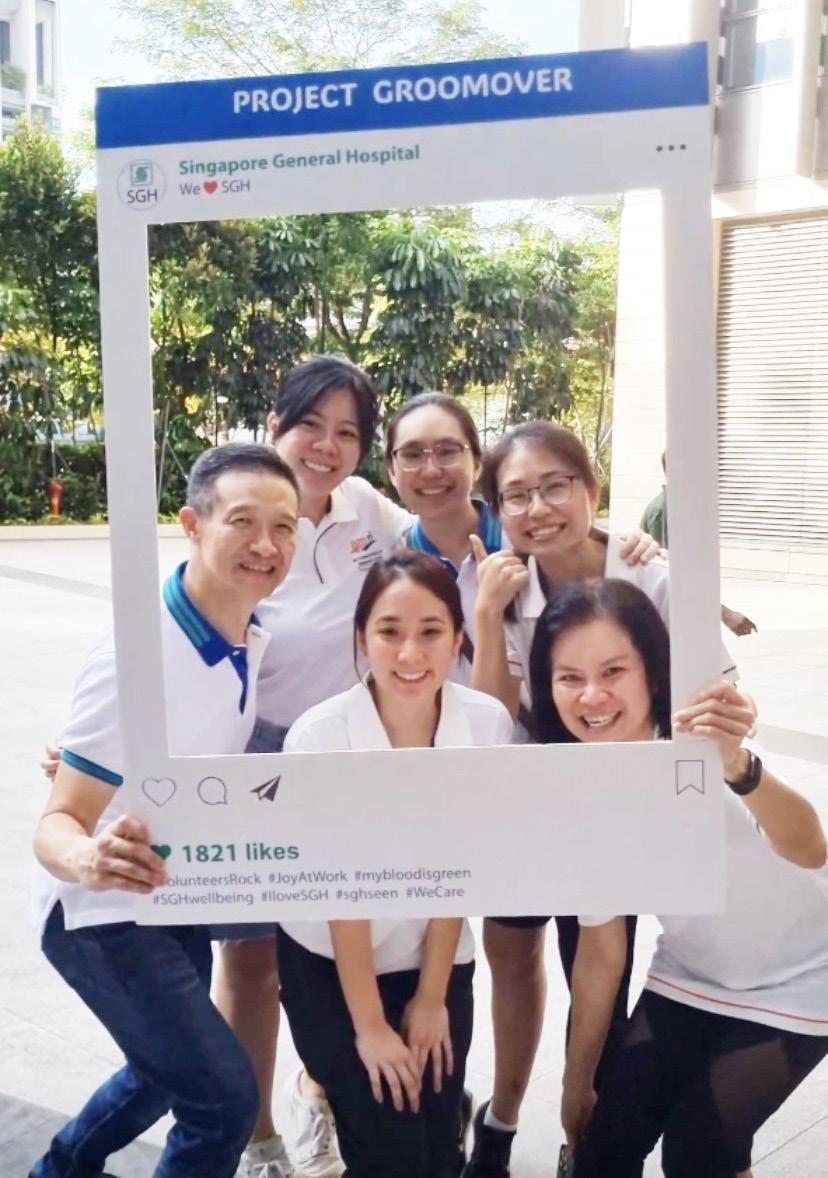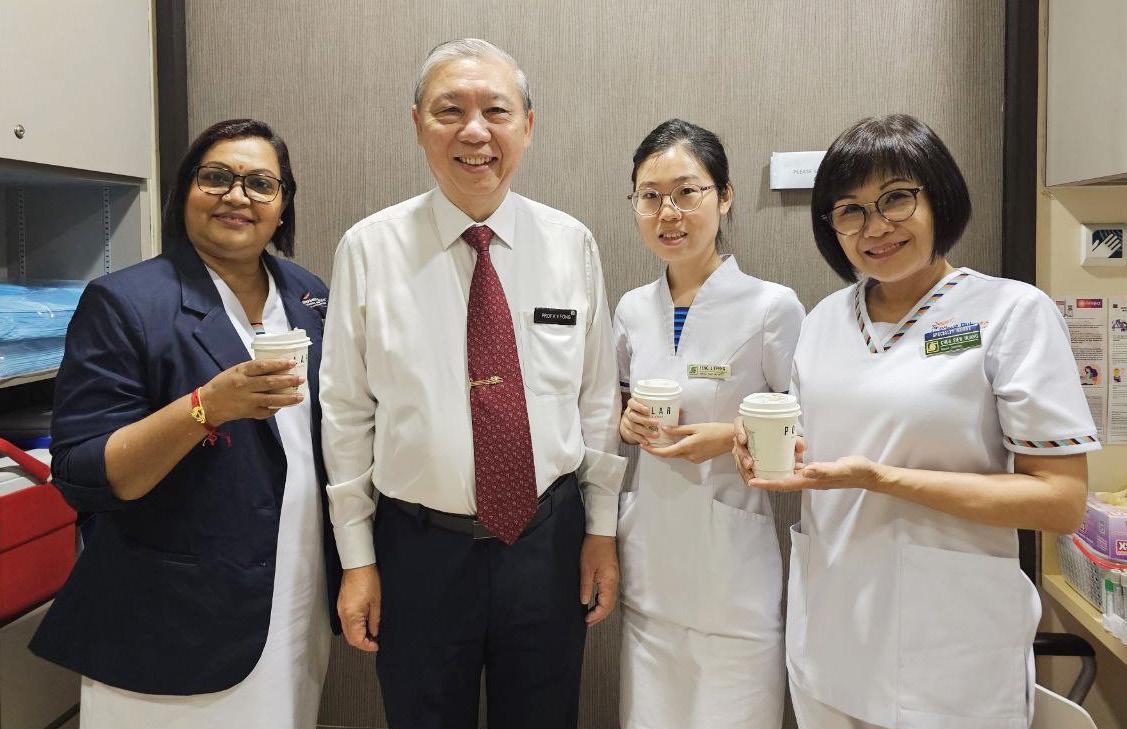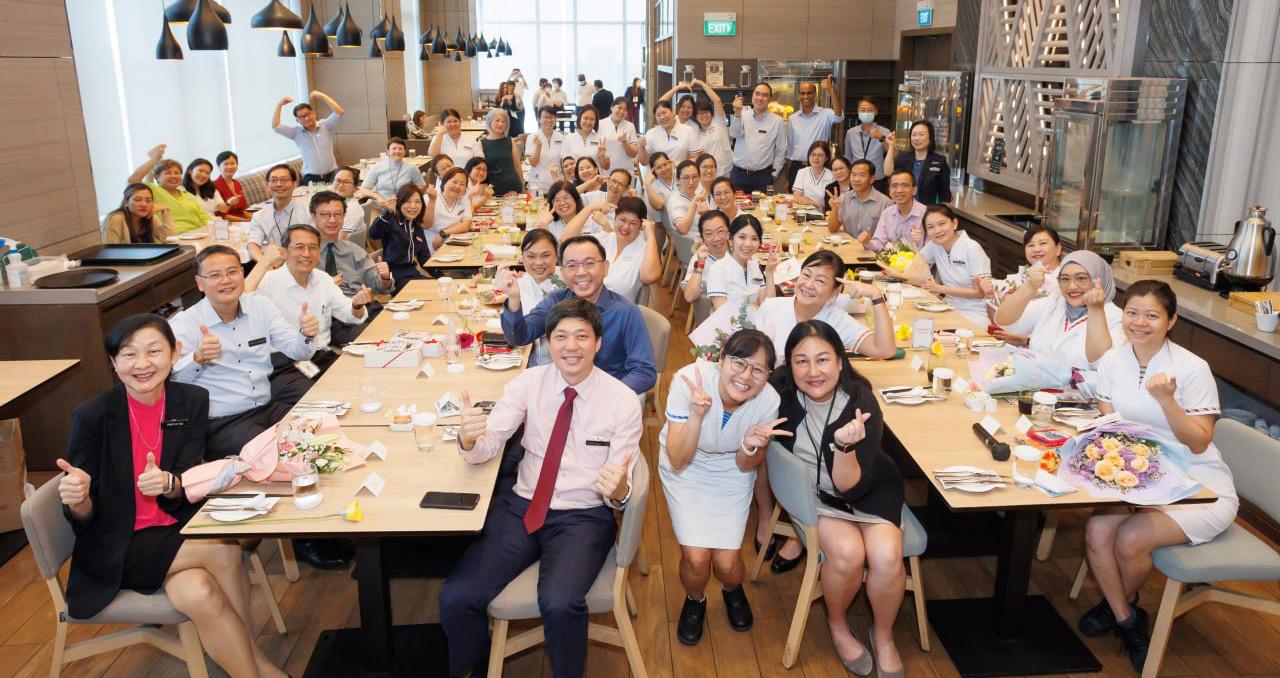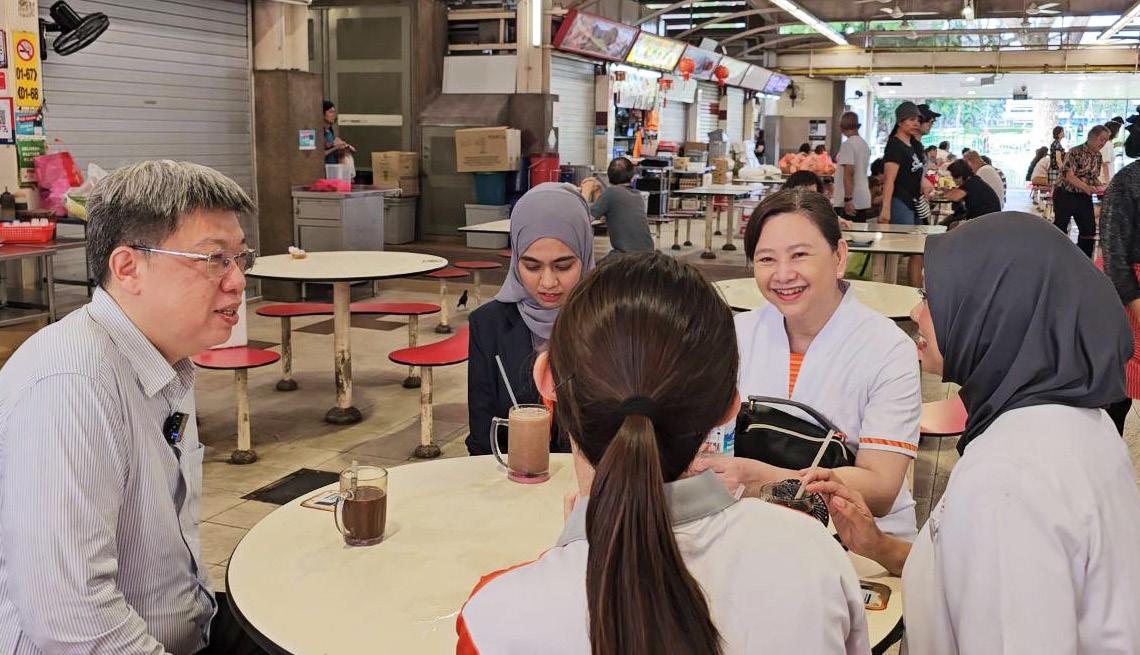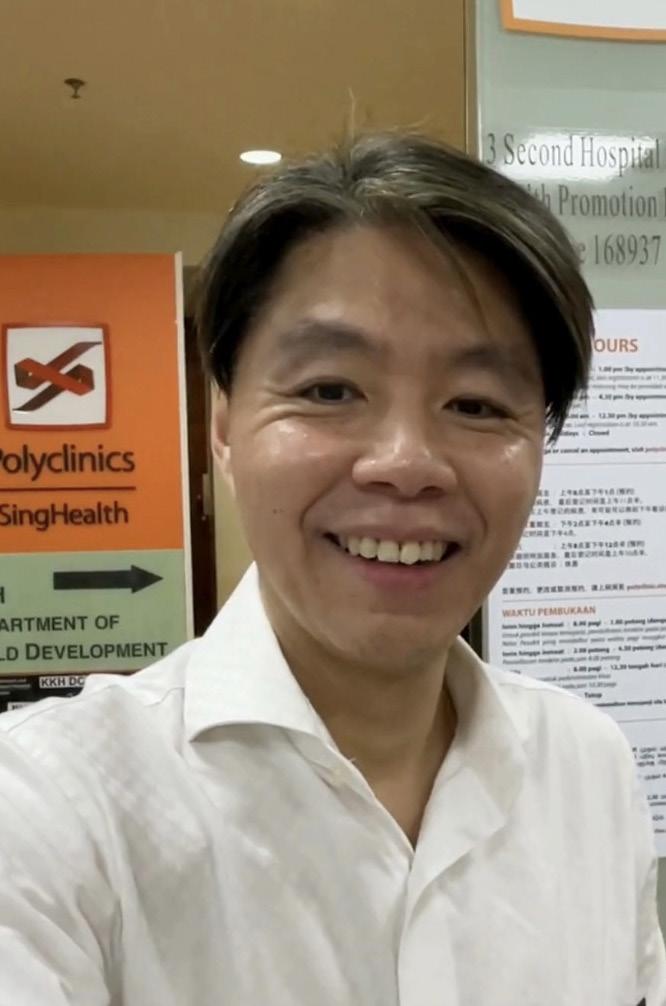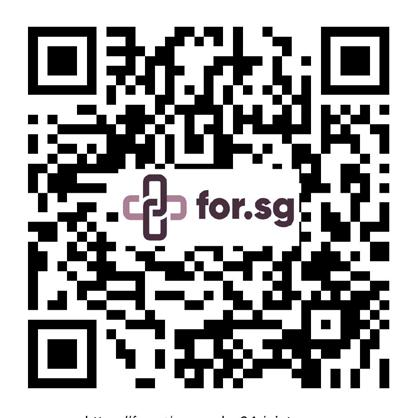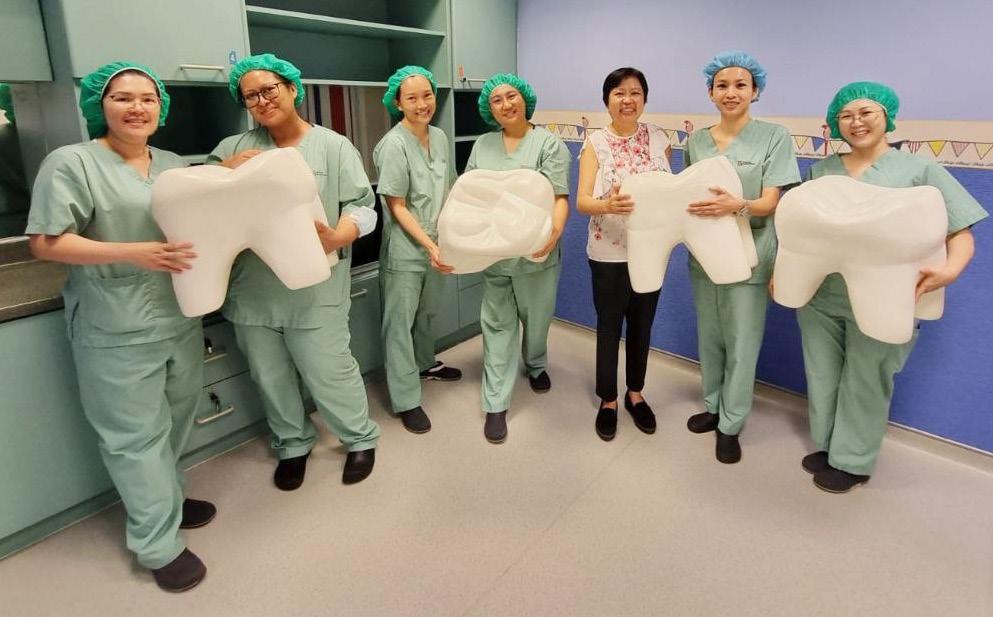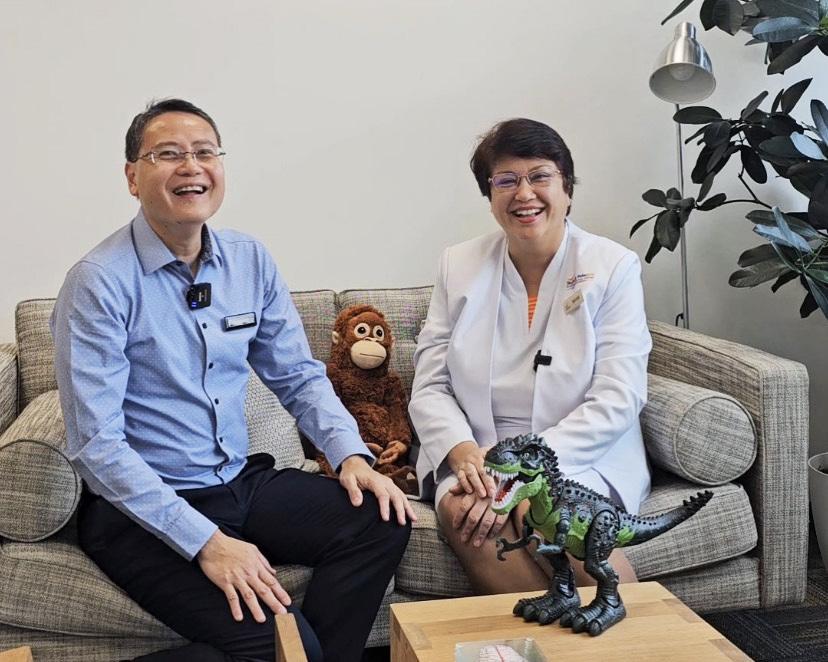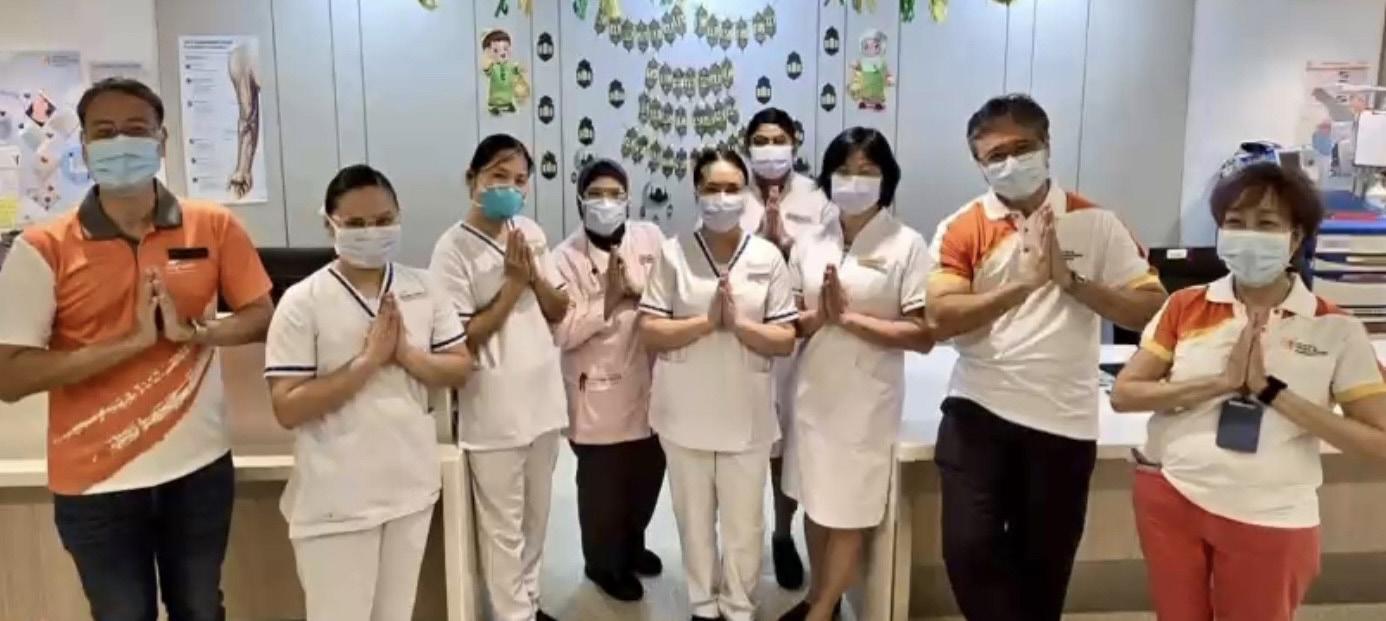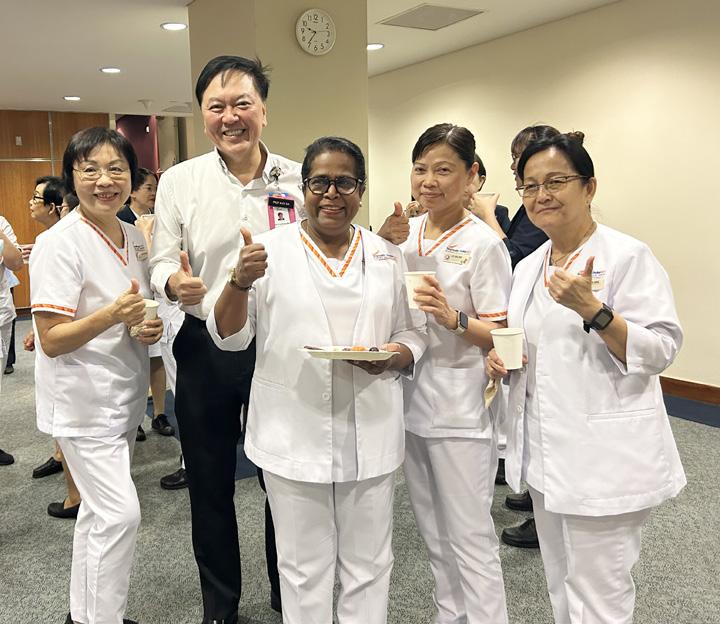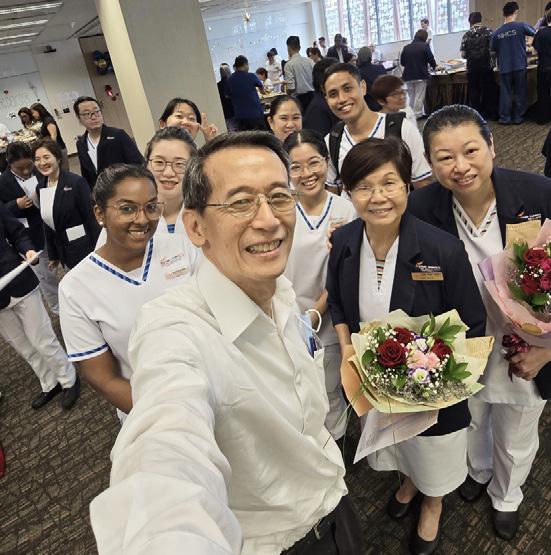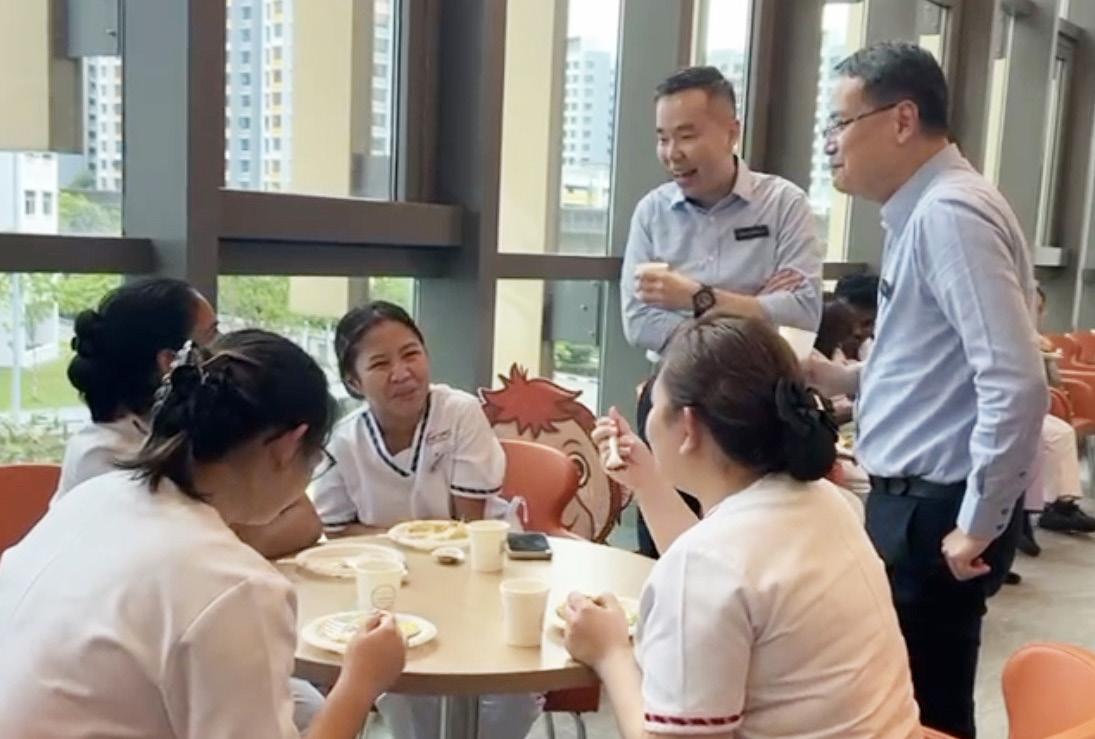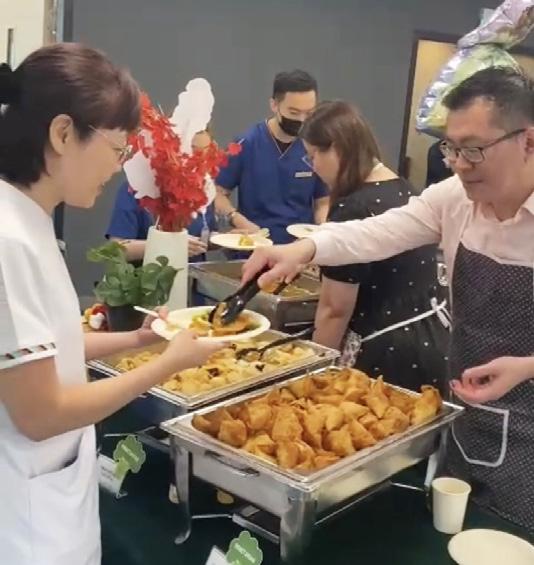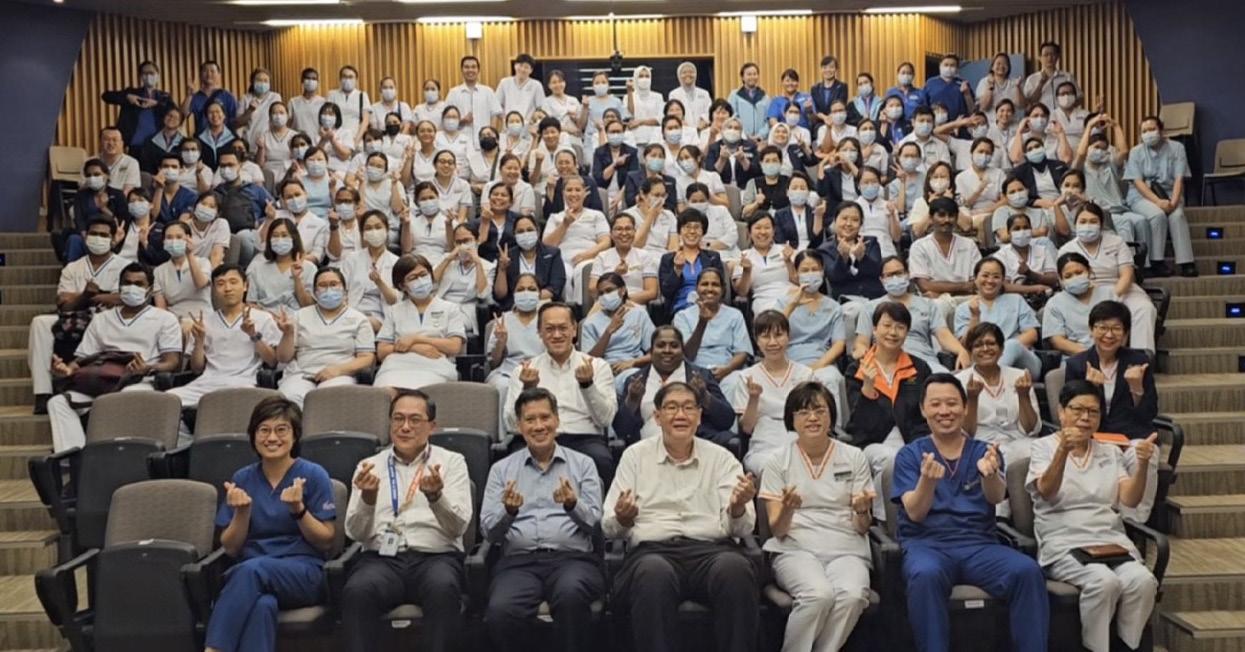Care Across Borders



PUBLISHER

CO-PUBLISHERS




PUBLISHER

CO-PUBLISHERS
CONTENT ADVISORS
Group Chief Nurse, SingHealth
Adj Prof Tracy Carol Ayre
Group Chief Communications Officer, SingHealth
Audrey Lau
Deputy Group Chief Communications Officer, SingHealth Jennifer Wee
EDITORIAL TEAM
Kan Wei Mun, Celine Sim, Jenny Ang
Read Singapore Health online at www.singhealth.com. sg/singaporehealth
Selected photos featured were taken prior to the COVID-19 pandemic. For all recent photo shoots, safe distancing measures were adhered to.
PUBLISHING AGENT
ThinkFarm Pte Ltd
Managing Director
Christopher Tay
Head, Editorial
Chua Kim Beng
Head, Creative Lee Lily
Head, Client Relationship
Jessie Kek
For advertising enquiries, please call 6831 1299 or email advertise@thinkfarm.sg
All rights reserved. Copyright by Singapore Health Services Pte Ltd (registration no.: 200002698Z). Opinions expressed in Singapore Health are solely those of the writers and are not necessarily endorsed by SingHealth Group and/or Thinkfarm Pte Ltd (registration no.: 201226362G), and their related companies. They are not responsible or liable in any way for the contents of any of the advertisements, articles, photographs or illustrations contained in this publication. Editorial enquiries should be directed to the Editor, Singapore Health, 168 Jalan Bukit Merah, #13-01 Surbana One, Singapore 150168, or email: singaporehealth@singhealth.com.sg. Unsolicited material will not be returned unless accompanied by a self-addressed envelope and sufficient return postage. While every reasonable care will be taken by the Editor, no responsibility is assumed for the return of unsolicited material. ALL INFORMATION CORRECT AT TIME OF PRINTING. MCI (P) 003/07/2024. Printed in Singapore by Times Printers Pte Ltd (registration no.: 196700328H).
As healthcare evolves, nursing is set to transform with advanced roles, new technologies, and a focus on holistic and compassionate care. Adjunct Professor Tracy Carol Ayre, Group Chief Nurse, SingHealth, explores these exciting changes and the critical skills nurses will need to thrive.
By Timothy Wee Photos Vernon Wong
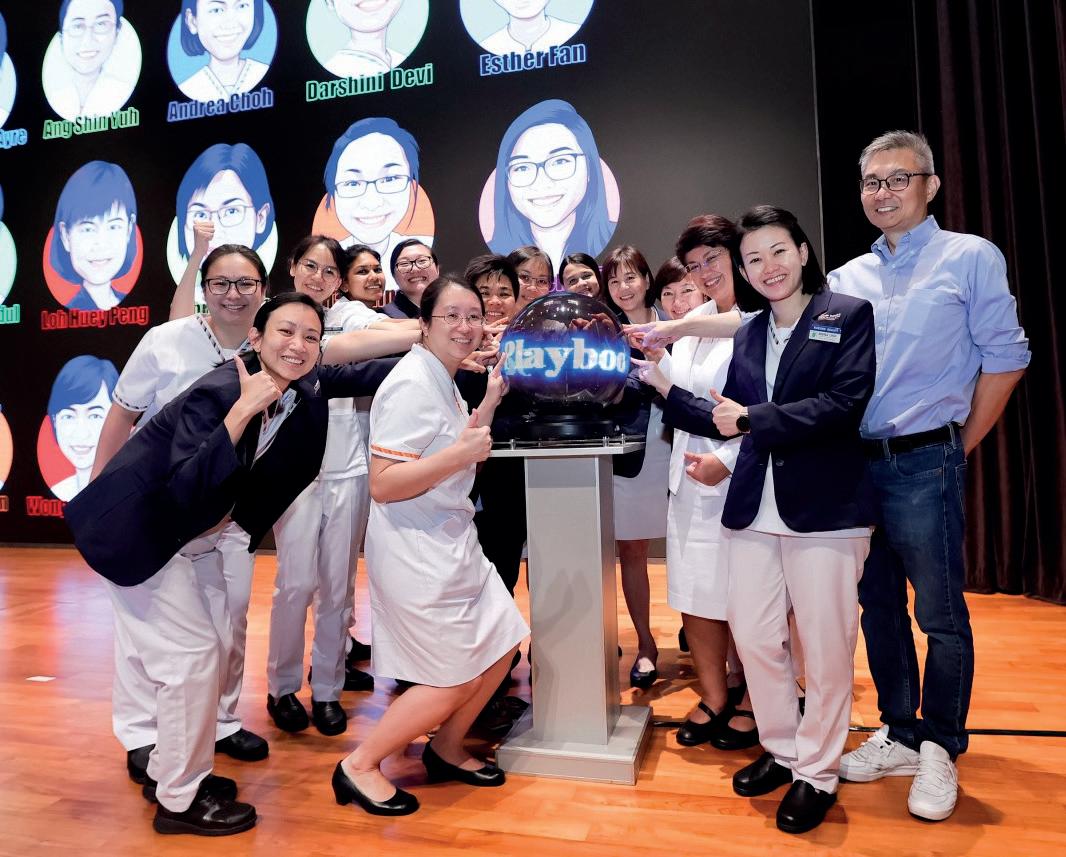
Tracy Carol Ayre Group Chief Nurse SingHealth
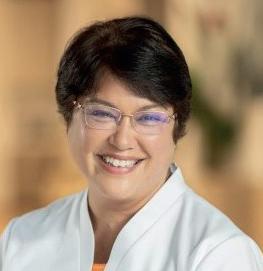
The future of nursing is exciting, to say the least. A few major trends will shape the nursing profession. Care models are shifting and will continue to evolve due to a rapidly ageing population, greater emphasis on preventive care and population health, and shifting of care to the community and homes. To support this shift, nurses will take on expanded roles with greater autonomy. They will need generalist skills and knowledge in order to provide holistic care across the lifespan — from pre-conception to the dying. But we will also continue to develop nurses in specialised and advanced roles, including developing Advanced Practice Nurses for the community. Essential skills like communications, interprofessional collaboration, and speaking up for safety will continue to be important, but nurses will need to learn future-ready skills like innovation, data analytics, and process reengineering. Technology like robotics,
artificial intelligence, and smart wearables will augment their work.
I have often been asked whether technology will replace nurses in the future. No, because nurses are valued for the human touch they provide, and they will need to learn how to maximise the use of technology in order to have more time providing direct patient-centric care with compassion and empathy.
The world of nursing education will continue to evolve, given these shifts in patient care. The use of technology to augment clinical training and competency building will proliferate. Schools will work more closely with the healthcare systems to develop practice-ready nurses who are resilient and can contribute to the agenda of building tomorrow’s healthcare.
Nursing leaders will continue to prioritise fostering healthy and supportive work environments where everyone will thrive. The COVID-19 pandemic was a wake-up call for us to focus on nurses’ well-being and retention factors such as burnout, flexible work arrangements, and staff safety.
On the global front, there is greater recognition of the importance of sustainability, diversity, inclusivity and equity within healthcare and nursing. Nurses have a huge potential to contribute to global health initiatives like building capacity and capability of nurses in our regional countries to address health disparities and promote healthcare access. The establishment of the Centre for Global Nursing (p13) is just one of the many new developments that nursing is carving out, reflecting a dynamic and impactful future for the profession. As the profession evolves, nurses will continue to play a pivotal role in shaping healthcare and defining tomorrow’s medicine.
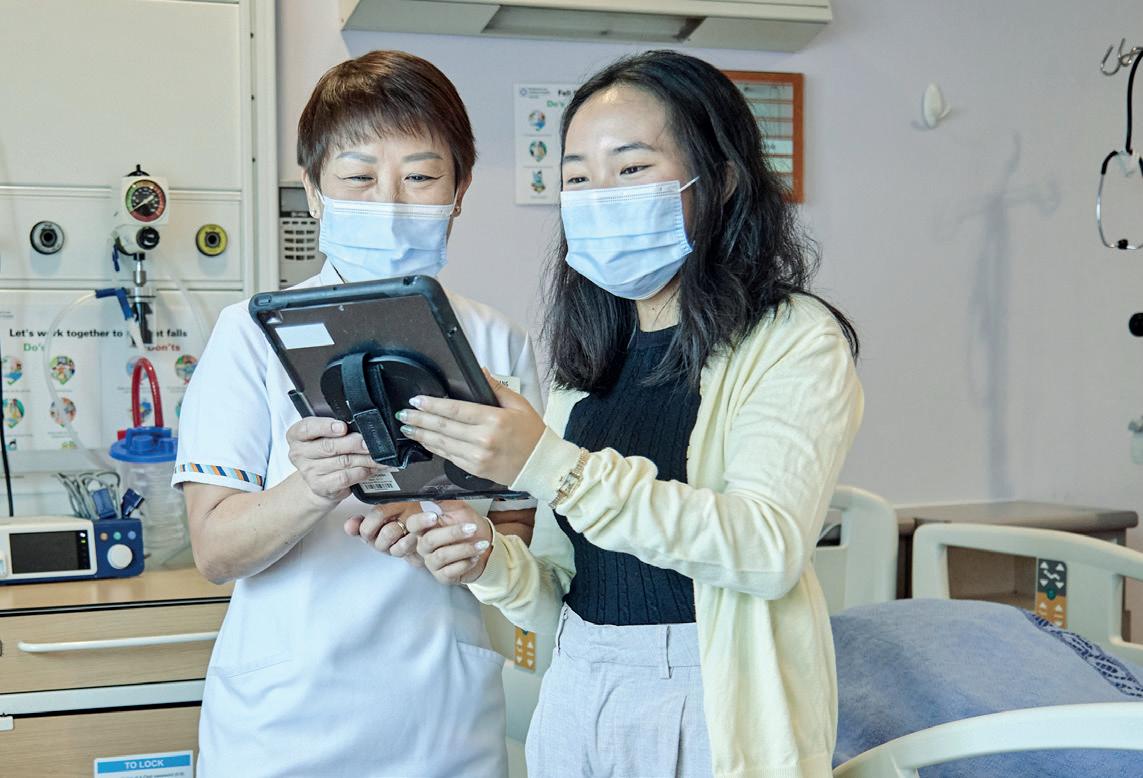
Kam Wee Fang
Senior Nurse Manager
KK Women’s and Children’s Hospital
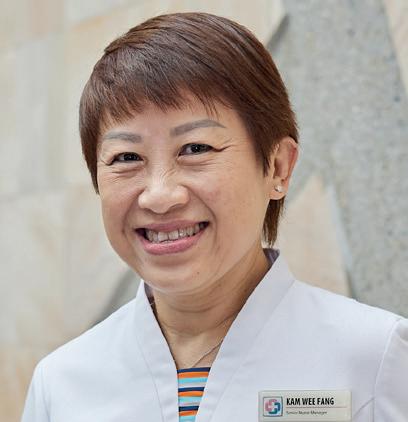
SThe Food In & Out app allows caregivers to chart a patient’s food intake and output, as well as basic information such as bowel movements, into the iPad before the information is verified by nurses. This reduces the need for nurses to constantly check on the patients, allowing them to focus on more crucial tasks.
During the trial period, Wee Fang led her team to trial the app, ensuring that it remains user-friendly for patients of all ages. She put herself in the shoes of patients young and old to pre-empt potential difficulties and conveyed her team’s concerns to the app’s vendors through a series of feedback sessions. There were many rounds of tweaks before Food In & Out was officially launched.
believes in the constant need to innovate and harness technology to create the smart hospital wards of the future, and enable future nurses to deliver a higher quality of care, ensuring that all patients are well taken care of.
Known for being a people’s person, Wee Fang currently oversees the Medical Paediatric Wards at KKH, and is just as passionate about her job as the day she started in 1982. “Nursing is very interesting because you get to interact and learn from people from different walks of life,” she said.
enior Nurse Manager Kam Wee Fang is transforming paediatric nursing with her innovative approach to technology at KK Women’s and Children’s Hospital (KKH). Leading the Nursing Software Suite (NuRSS) project in 2019, Wee Fang and her team rolled out a bedside iPad system with a user-friendly interface at most wards across SingHealth hospitals. The team has progressively released three applications — Mycare, Myedu, and Food In & Out, and a medical knowledge resource — to date.
Since its roll-out, the app has received plenty of positive feedback from nurses, patients and caregivers. The mother of one of her paediatric patients hailed the app as “a good initiative” and felt “empowered and happy to be part of her daughter’s care team”. The proud mum even taught her nineyear-old to input her own information so that both of them could work together to monitor her health, even after leaving the hospital.
Food In & Out represents a step towards the healthcare setup of tomorrow. With a growing patient population, Wee Fang
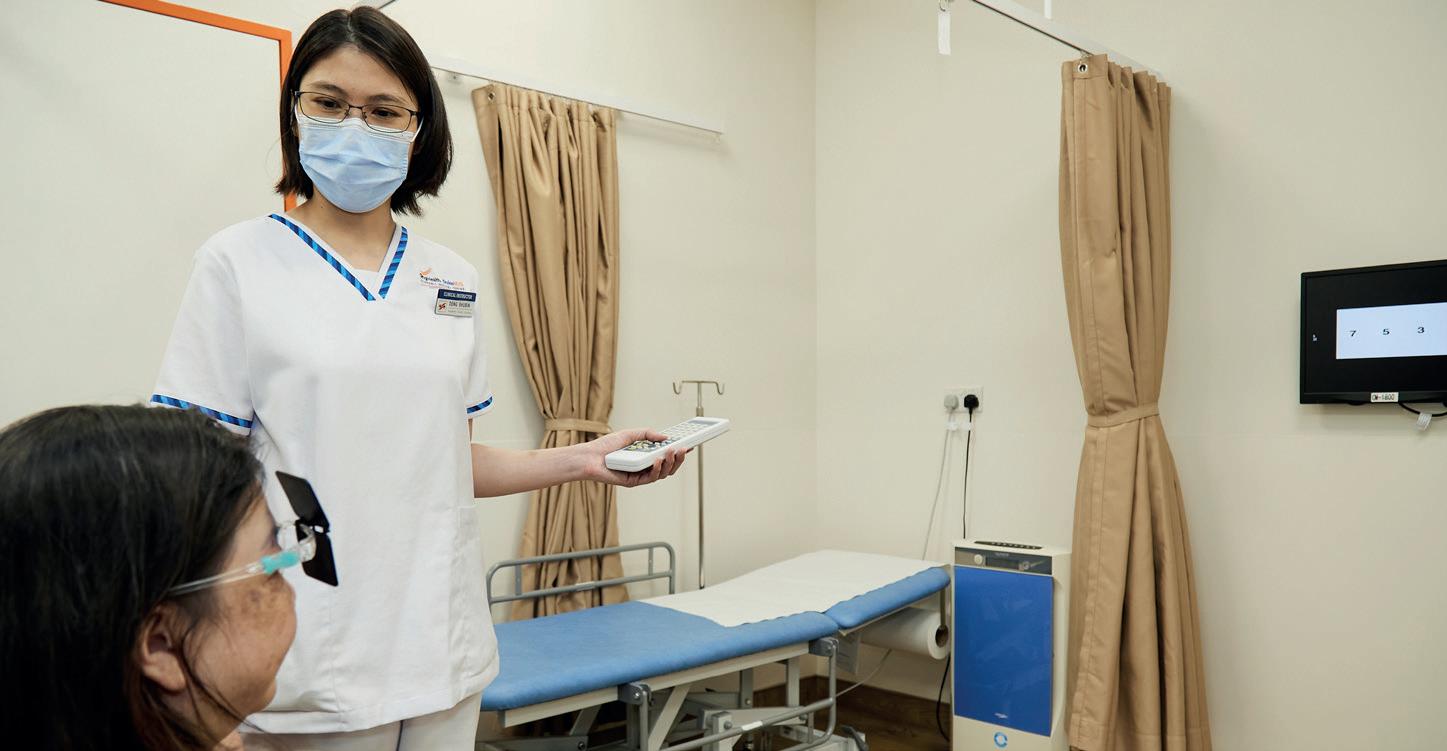
Assistant Nurse Clinician
SingHealth Polyclinics - Eunos
The SingHealth Polyclinics (SHP) Nursing Innovation Workgroup Committee comprises nurses from various polyclinics, including Assistant Nurse Clinician Deng Shubin. The committee meets regularly to discuss common problems that they encounter and how these challenges can be met.
In one such meeting, the nurses noted that many patients often struggle to hold the hand-held eye occluder during visual acuity screenings. The hand-held Lorgnette Spectacle Occluder is challenging for patients with weakened motor strength to hold, creating inefficiencies as administering nurses spend more time on
the test when a patient is struggling. “A hands-free occluder will reduce the time spent and enhance the patient and staff experience,” said Shubin.
In 2023, Shubin formed a team with three other senior staff nurses — Stella Sim, Zarina Binte Yusoff and Lim Cheau Yee — to develop a hands-free solution.
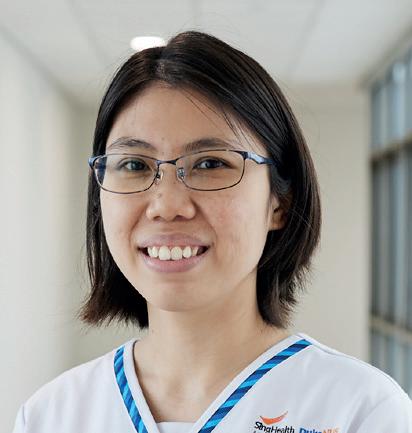
Enlisting guidance from the Alice Lee Innovation Centre of Excellence (A.L.I.C.E), Shubin led her team
to survey 100 patients and 77 nurses on their experience with the vision test at four polyclinics. They found that 25 per cent of the patients surveyed could not hold on to the hand-held occluder due to shaky hands, while 71 per cent of the surveyed nurses encountered patients requiring assistance around one to three times a month.
The survey findings prompted Shubin and her team to conceptualise a flexible wearable solution. “It can be like a pair of spectacles worn by the patient, so we’ll also be able to flip on the pinhole and opaque attachment on the mechanism,” she explained. At the same time, patients can undergo the vision test without
With 34 years of paediatric nursing experience, the Master of Science (Clinical Leadership) holder has engaged with patients and caregivers in KKH’s Paediatric Intensive Care Unit, High Dependency, and Haematology/Oncology Wards. Her peoplecentred approach led her to this realisation: “You have to listen to patients and caregivers attentively, try to put yourself in their situation, and understand what they’re going through.”
She makes it her mission to deliver personalised care by spending more time with patients and exploring new ways to streamline work processes. Together with her team members, she harnesses technological innovations to manage administrative tasks for greater efficiency. “Technology allows nurses to focus on true patient care,” she asserted.
having to hold the occluder, making the examination less stressful for them.
Unable to find an existing solution or product, they approached A.L.I.C.E. for assistance to develop a prototype. They participated in the SingHealth Nursing Innovation Challenge 2023 and were awarded a $5,000 grant last November to craft and trial their prototype. Although the prototype is now ready, it will be a while before it is adopted for general use. Going forward, she and her team will undertake Quality Improvement trials of their handsfree prototype with patients and nurses before developing a functional prototype.
Shubin’s passion for nursing stems from her upbringing. Inspired by her parents, she goes about her duties at SHP - Eunos with a generous spirit. “My parents are my pillars of strength. They’ve given their very best to me without expecting anything in return,” she shared. The 35-year-old believes in providing comprehensive care and health education to patients through innovative approaches. “I strive to deliver the highest quality of care to meet my patients’ needs,” Shubin said with pride.
A Master of Science (Applied Gerontology) degree holder, Shubin was recently promoted to a Nurse Clinician role. Her knowledge of available community resources allows her to better advise patients on preventive screening. She is convinced that innovations are essential for the future of healthcare as they benefit not only the patient but also nurses.
Five
nurses demonstrate how they draw on research and innovation to improve patient care in their practice.
By Timothy Wee Photos Vernon Wong
The resilient nurse
Nurse Clinician Lim Siew Hoon, Nursing Division (Nursing Research), Singapore General Hospital (SGH), is a widely-published nurse researcher who started her nursing career as a staff nurse at SGH.
Siew Hoon is also a Clinical Assistant Professor with Duke-NUS Medical School who believes that resilience — the essential trait of a nurse — has enabled her to become who she is today. “Resilience equips nurses with the mental and emotional strength to navigate the complexities of the healthcare landscape, overcome obstacles, and ultimately make meaningful contributions to advance nursing knowledge and improve patient care,” she said.
This attribute was evident in Siew Hoon as soon as she joined nursing fresh out of school and thrived in the rich clinical environment of SGH’s colorectal surgical ward. The clinical experience she gained there taught her the importance of a rigorous and evidence-based approach towards improving patient care. Even now, her resilience holds her in good stead as she juggles various roles, from providing direct patient care to doing research.
As a researcher, Siew Hoon draws on her clinical experience to not only inform her research projects, but also improve existing nursing practices, education and policies. She retains an interest in nursing care quality, outcomes, and issues pertaining to the workforce.
In 2018, Siew Hoon served as the Principal Investigator of a research paper, which documented SingHealth’s nursing heritage. She counts it as “one of her most memorable projects that has touched her on a personal level”. It also won the Best Publication Award in the 2023 SingHealth Nursing Awards. Entitled ‘Memories of Nursing in Singapore – An Oral History Approach’, her team interviewed 54 nurses — whose work experience ranged from 10 to 54 years — “to capture the experiences, perspectives and wisdom of nurses throughout history, preserving their contributions to healthcare and nursing practice for future generations”.
The interviewees shared their motivations for joining the profession and some rewarding
Lim Siew Hoon
Clinical Assistant Professor, Duke-NUS Medical School; Nurse Clinician, Singapore General Hospital
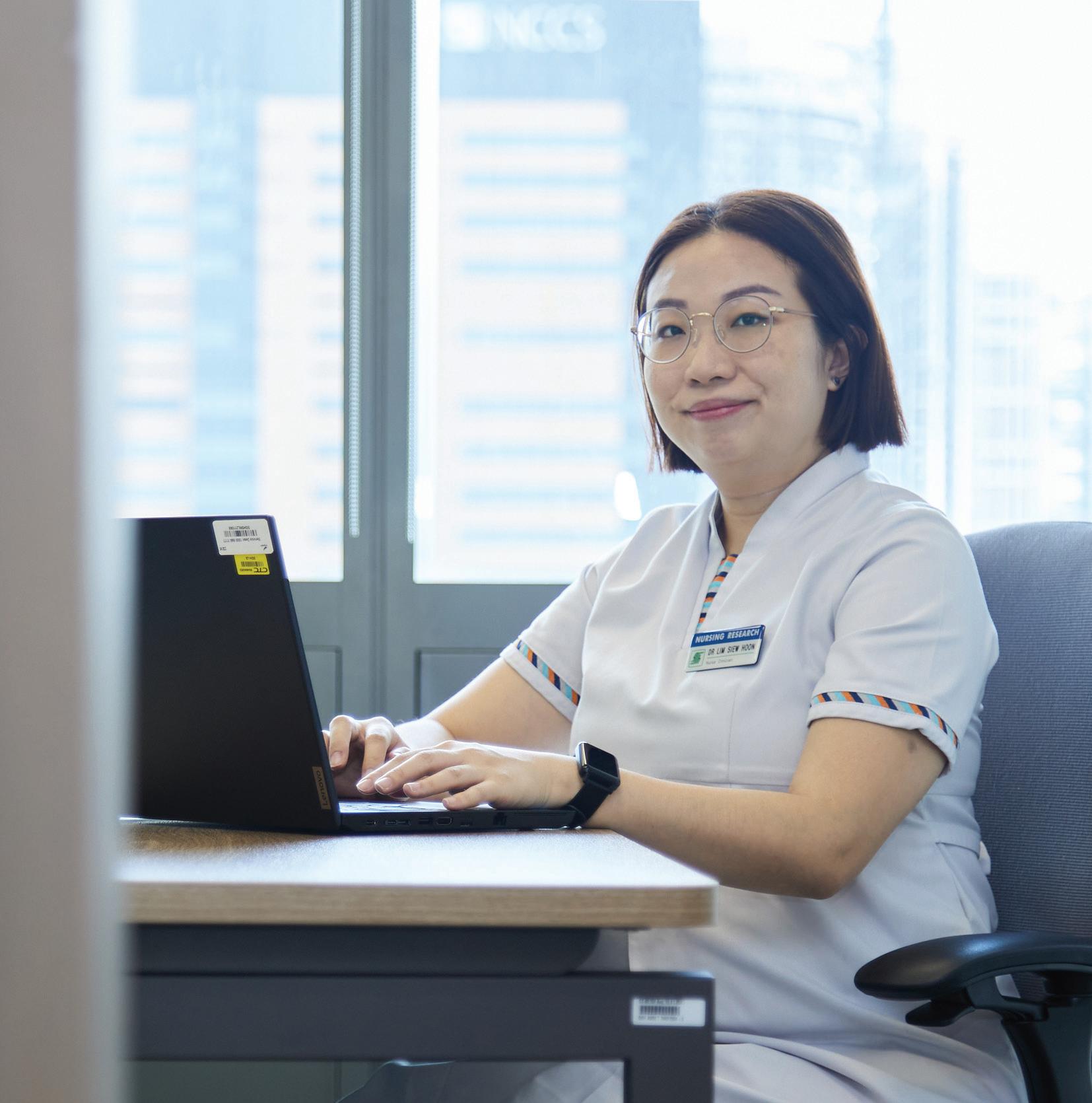
moments. They also spoke about major events in Singapore, such as the Spyros disaster of 1978 and the Severe Acute Respiratory Syndrome (SARS) outbreak in 2003. The interviews also covered the nurses’ observations on the evolution of nursing roles.
“Through this project, sharing stories of resilience, innovation and advocacy inspires current and future generations of nurses, fostering a sense of pride, identity and commitment to the profession,” said Siew Hoon. Among the many findings, she and the team noted that the role of a nurse is rapidly expanding, and that continuous learning will be necessary for nurses to keep up with the changing healthcare landscape.
One personal lesson that holds a special place in Siew Hoon’s heart is that nursing is about the human touch and that bedside nursing still forms the core of the profession. With the support of her supervisors, she is still covering clinical duties at SGH’s colorectal surgical ward. “It’s essential to stay connected to nursing care at the frontlines while conducting research. Ultimately, our goal is to improve healthcare outcomes on a broader scale,” she stated.
Sng Qian Wen
Nurse Clinician
KK Women’s and Children’s Hospital
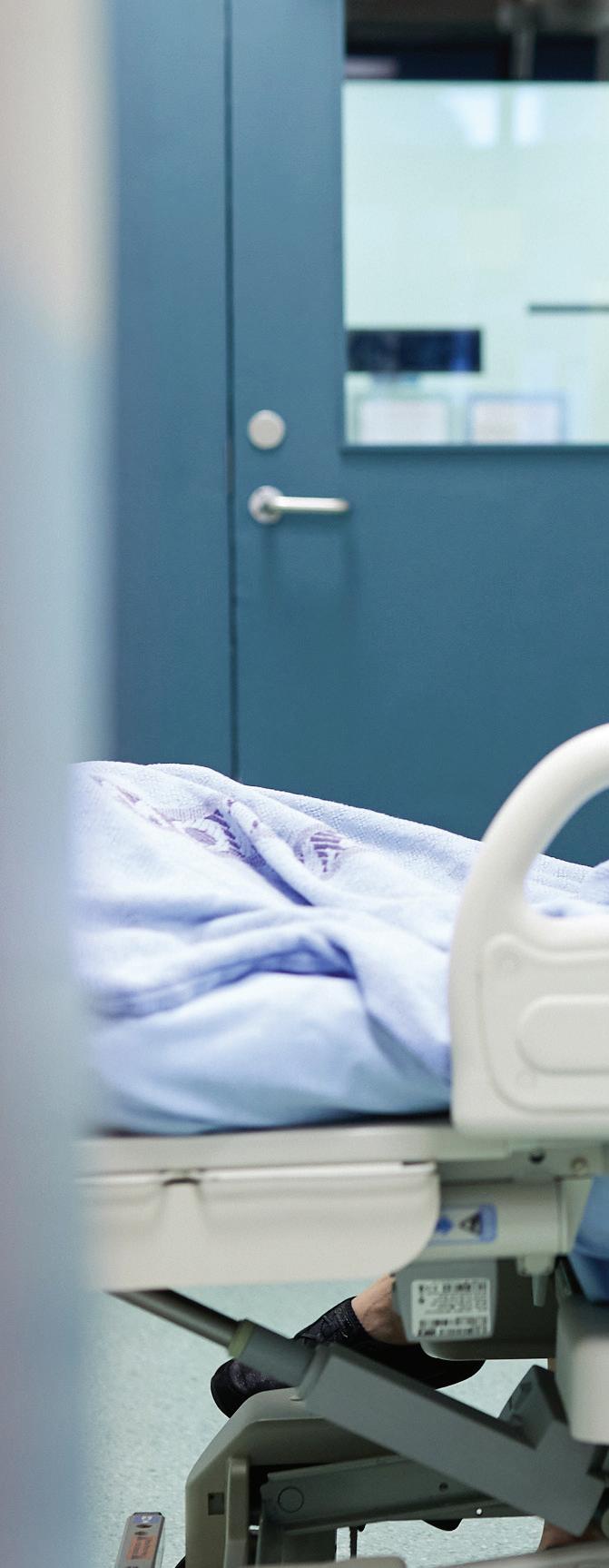
Refusing to adapt isn’t an option
“A
daptability has become a fundamental trait for nurses to thrive in the ever-changing healthcare industry,” said Nurse Clinician Sng Qian Wen.
This mindset propelled her to get involved in nursing research in 2013. Qian Wen was part of a team that set out to evaluate caregivers’ satisfaction with their stay in KK Women’s and Children’s Hospital’s (KKH) Children’s Intensive Care Unit (CICU) to identify areas of improvement in practices and facilities provided to them. Interviewing selected caregivers, she garnered positive feedback in areas such as involved decision-making, patient education, and respectful treatment from staff. However, they highlighted a need for rest and shower facilities, charging ports, and vending machines. Calling it her most memorable project, Qian Wen said that the experience not only deepened her knowledge of research methodologies but also how to improve the experience of caregivers and patients in the hospital.
Thereafter, Qian Wen started to get more involved in research while maintaining her clinical nursing duties. This expansion of her nursing role resulted in a sense of personal satisfaction while establishing a strong support network. She is thankful for SingHealth’s support for nurse researchers, and the many opportunities to present their findings and upskill themselves through lectures and workshops. “I’ve had the privilege of meeting different luminaries in the paediatric intensive care research world through international events and conferences. These exposures broadened my perspective. It’s inspiring to see many
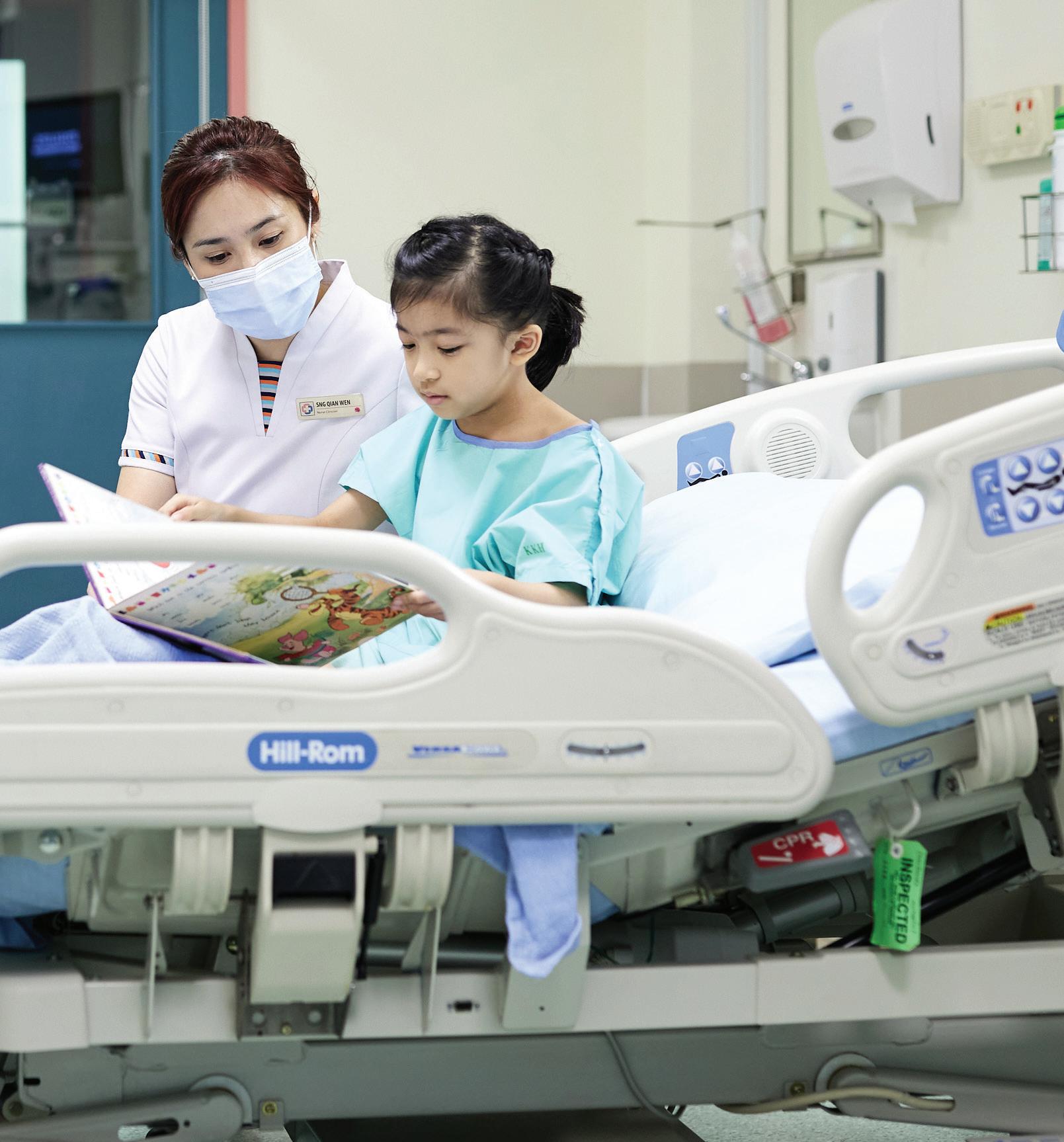
bright minds working tirelessly to improve patient outcomes,” she said.
It is also through her strong support network of mentors and supervisors that enabled her to embark on one of her most proudest projects to date: the nurse-led feed protocol for CICU. Chosen as the leader of the small team of CICU nurses, Qian Wen sought to devise a customised patient feeding protocol for KKH’s CICU. Adopting an evidence-based approach, she and the team started looking through successful models of feeding protocols used worldwide. At the same time, the team examined their existing clinical practice to identify issues like the accurate documentation of fluid intake by patients.
Besides her team, Qian Wen worked alongside other hospital stakeholders such as CICU doctors, dietitians and nurses. With this multidisciplinary approach, the team was able to formulate and implement a patient-feeding algorithm for their CICU. “This was one of the projects that made me grow the most, as I learnt research skills, implementation skills, change management, and communication skills,” Qian Wen recalled. Additionally, the project also saw significantly positive outcomes for patients and nurses alike. With the new feeding protocol, her patients were able to receive their required nutrition in a timelier manner. Furthermore, the new feeding algorithm was also found to be more user-friendly, saving time and reducing additional workload for the clinical nurses. Yet, even with such positive results, Qian Wen still seeks to find ways to continue improving nursing work processes and clinical care. “I realised that these projects are a continuous work-in-progress as well. It doesn’t end when the data collection is over.”
Tan Kai Beng
Assistant Nurse Clinician
Sengkang General Hospital
A grandson’s tribute
The memory of his grandmother’s last days still gets Assistant Nurse Clinician Tan Kai Beng emotional, but the experience set him on the road to a career in nursing. “Deep inside, I knew that healthcare was something I was really interested in, especially because of my past experience of my grandmother’s hospitalisation,” said the 34-year-old.
Kai Beng’s grandmother had fallen ill suddenly and was admitted to the intensive care unit (ICU). Unfortunately, she passed away after a prolonged stay. Still, Kai Beng is grateful for the care shown by his grandmother’s nurses. “As the patient’s caregiver or family, the experience can be isolating. Although the healthcare workers were very busy, they tried to be attentive and update us whenever possible.”
Not only was he inspired to become a nurse, Kai Beng developed an interest in geriatric nursing. Initially, he worked in a multidisciplinary ward after joining Sengkang General Hospital (SKH) in 2017. In 2021, he chose to pursue a specialisation in Gerontology as he wanted to “empower elderly patients and their caregivers to be confident in providing continuity of care at home for seniors to age well and thrive”.
departments. “By getting such differing views, you are then able to scale the project and make it sustainable,” explained Kai Beng.
The team sought to propose and implement a nurse-driven delirium care protocol to better identify at-risk elderly patients aged 65 and above, and reduce the number of falls, pressure injuries, and use of physical restraints among them. By identifying at-risk patients early, nurses can then implement non-medication interventions outlined in the delirium care bundle. Kai Beng observed that improving cognitive stimulation, diet, bladder and bowel care through simple measures such as therapeutic activities, maintaining oral hygiene, and regular toilet trips can prevent and/or reverse the patient’s delirium.
Since its implementation in 2021, the protocol has achieved encouraging results based on feedback from the nursing team. In a post-implementation survey, Kai Beng and the team found that, among 1,700 patients, the use of physical restraints on delirious elderly patients reduced from 9 per cent to 7 per cent, with the number of at-risk patients decreasing from 27 per cent to 21 per cent. It was unsurprising that the nurse-driven delirium care management team clinched the Best Team Award for Nursing Excellence at the SingHealth Nursing Awards in 2023.

Kai Beng is also on the Nursing Quality Management team, which evaluates existing patient safety and nursing work processes to improve nursing standards. This aligns with Kai Beng’s drive for research and innovation, which is evident by his involvement in the nurse-driven Delirium Care Management Quality Improvement Project. Due to his training in gerontology, Kai Beng was one of the resource nurses in the elderly delivery care protocol project. He contributed to the planning, data collection, and implementation of the new delirium care protocol at SKH. He was impressed by the collaborative nature of the project, since the team comprised of nurses from different
Kai Beng also clinched the Best Nurse Publication of the Year award for his work on another Quality Improvement Project, which compared the effectiveness of two popular skin disinfection techniques: concentric circle, and back-and-forth. Kai Beng was pleasantly surprised that his skin disinfection study struck a chord with not just healthcare professionals but the general public as well. In fact, he discovered his research article being referenced in a TikTok video on skin disinfection by a US-based nurse. “It was unanticipated; I’d never have thought that an article we wrote would be on TikTok. And it reached a much larger audience beyond Singapore,” exclaimed Kai Beng.
Koh Sze Fui Nurse Clinician National Cancer Centre Singapore
When she was a 17-year-old nursing student, Nurse Clinician Koh Sze Fui struggled to support a church friend who was diagnosed with cancer. She had limited knowledge of the disease, but spending time with her friend taught her a lot. She saw the value that oncology nurses brought to patients, from diagnosis to discharge — this experience inspired her to specialise in oncology.
“It’s very stressful to be diagnosed with cancer,” she said. “When a patient makes difficult demands or reacts negatively, it’s important to understand what caused it.” This is something she tries to inculcate in the new nurses in her ward as part of her role in overseeing their on-the-job training. “I find it meaningful to journey with patients and support them through the emotional ups and downs.” This led her to consider ways to improve the patient experience at the National Cancer Centre Singapore (NCCS).
As part of the patient care management system, Sze Fui and her colleagues used an internal scheduling system called RAPID for booking chemotherapy treatments. When NCCS moved to its new building, a new system was required to handle the expected increase in patient volume. Sze Fui became a part of a multidisciplinary team assembled to work on the Chemotherapy Scheduling System (CTS) project. She collaborated with colleagues from other departments such as pharmacy and clinical operations to evaluate the requirements for a new system.
Sze Fui was heavily involved in the initial research and development of the CTS, and was on hand to lend her expertise, providing valuable feedback and highlighting on-the-ground difficulties during the trial and implementation phases of the project.
The team expanded the functionality of the old system, which then enabled NCCS nurses to control their resources more efficiently. For instance, the enhanced CTS not only allows clinical operations staff to book a patient’s chemotherapy treatment sessions, but also monitors the real-time status of the patient, even if treatment is delayed. “This expanded monitoring enhances patient safety,” highlighted Sze Fui.
Sze Fui also explained that the CTS is now integrated with the centre’s main medical database system, enabling full access to a patient’s shared medical information. This interconnectivity is invaluable, as the CTS can alert staff if the patient has existing ailments or allergies that may prolong the treatment duration. It will also preemptively extend the patient’s appointment to avoid unwanted scenarios such as double-booking.
With the new CTS fully functional at NCCS, Sze Fui and the team are already looking to improve the system, such as getting it to process raw medical data and churn out reports to better inform nurses and assist in audits. She is grateful to be part of the team working on this. When asked the most valuable lesson she has learnt, she shared: “It’s about understanding the needs of all the stakeholders and finding a solution that would be ultimately be the best for patients.”

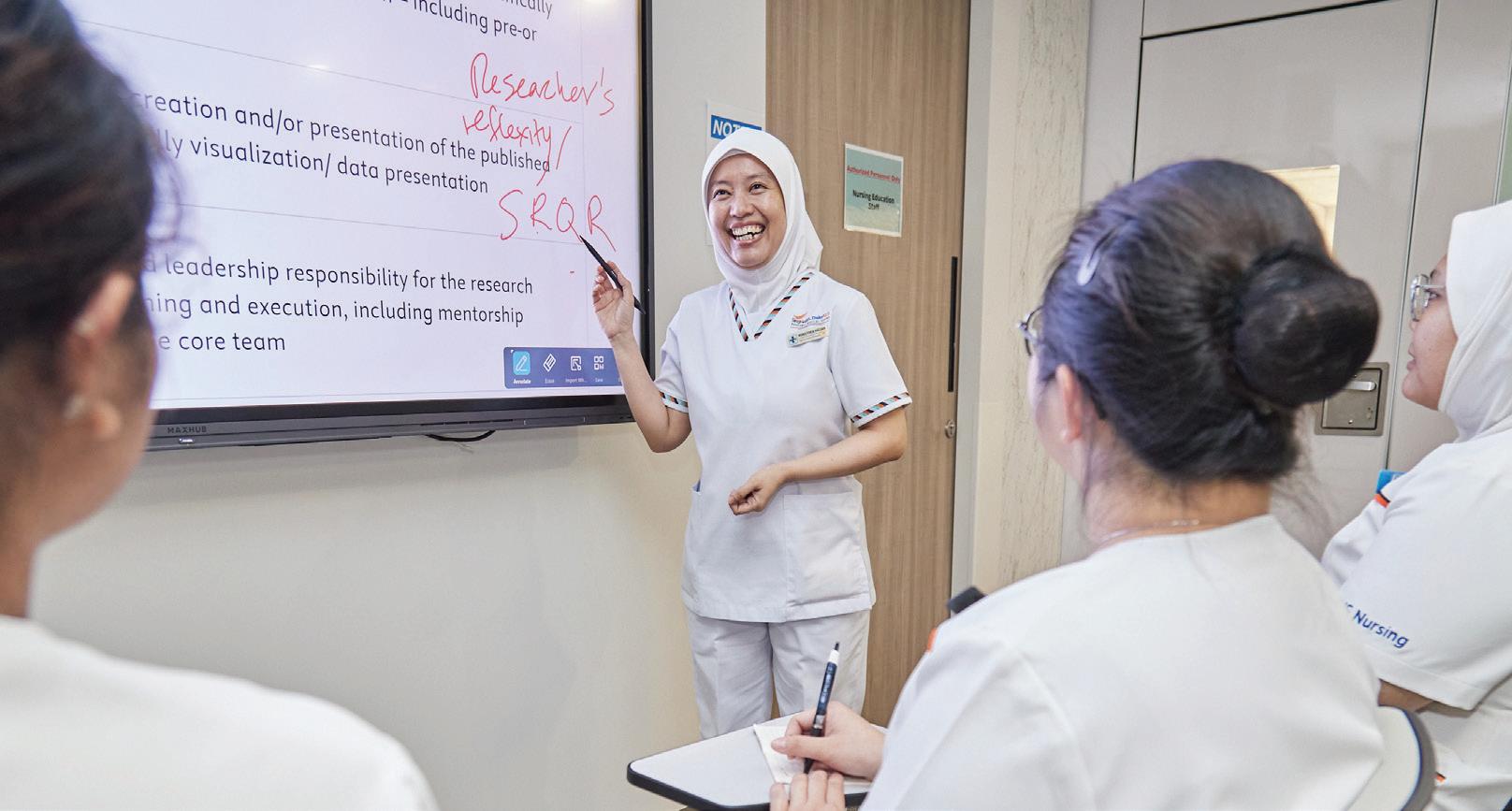
Norasyikin Binte Hassan Senior Nurse Manager Changi General Hospital
“Ithink I’m quite a curious person by nature. I like to ask questions, and what I enjoy most about nursing research is the interaction with people, be it fellow nurses and healthcare professionals, or patients,” shared Senior Nurse Manager Norasyikin Binte Hassan, who is currently in the Nursing Research department.
The 45-year-old joined the profession upon the advice of a teacher who had observed her affinity for working with people, and has been with Changi General Hospital (CGH) for over two decades. Since then, she has worked in various nursing disciplines, developing therapeutic connections with patients and an understanding of their diverse needs.
Seizing opportunities to upgrade and enhance her nursing skills and knowledge, Norasyikin obtained her Advanced Diploma and Bachelor’s degree and, subsequently, a sponsored Master’s degree specialising in nursing research. This exposed her to various research methodologies such as the systematic review, and honed her qualitative research skills, which dovetailed nicely with her extroverted personality and inquisitive nature.
“Qualitative research involves a lot of human interaction. I enjoy meeting people, and listening to their stories, so interviewing feels second nature to me. I think that keeps me motivated. Specialising in nursing research also allows me to continue doing work that has clinical impact, which is important to me,” she added.
Norasyikin’s expertise in research complements her role as a healthcare educator in clinical ethics, a field that focuses on decision-making processes to enhance patient care while minimising harm. “It’s crucial to find the synergy between clinical work and research, while ethical considerations ground these research efforts,” explained Norasyikin. “At the heart of this is the provision of holistic care for patients and for people. This is what guides me as a nurse.”
In 2022, Norasyikin and her team conducted participatory action research to design a curriculum for healthcare ethics education at CGH, aimed at helping nurses navigate ethical dilemmas encountered in their daily work. The dilemmas can range from managing repeated demands for food by patients with dementia, to decisions about life support and end-of-life care. Norasyikin collaborated with nursing stakeholders to identify common scenarios to aid nurses’ understanding, and shared practical tools to facilitate their decision-making.
To date, Norasyikin has conducted more than five runs of the workshop, and the feedback has been overwhelmingly positive. “It has supported and enhanced the nurses’ work. When dealing with demanding patients, they now recognise the signs and know how to respond accordingly,” she shared. Norasyikin continues to evaluate the workshop; drawing on her research background, she recently interviewed nurses on how the workshop has impacted them.
She was also involved in facilitating a one-day module in Healthcare Ethics, Law, and Professionalism at the National University of Singapore (NUS). This core academic module is part of an initiative by the Ministry of Health-appointed National Ethics Capability Committee (NECC) to enhance the capability of healthcare professionals in clinical ethics.
In addition, Norasyikin mentors nurses in CGH’s Nursing Research Fellowship Programme, and coordinates with the NUS Alice Lee Centre for Nursing Studies, helping to identify suitable research topics and supervise honours projects for nursing students at CGH. To date, she has nurtured more than 15 nurses and 60 honours students in conducting research projects, many of whom have published their studies and received awards.
“Even as I guide the younger nurses, I am learning from them. They are more expressive and versatile, with a strong keenness to learn. It inspires and reminds me to continue upskilling to stay relevant,” she said.
Five nurses share their experience with lifelong learning in SingHealth, with some making the transition to train other nurses and medical professionals.
By Goh Bee Lian Photos Vernon Wong
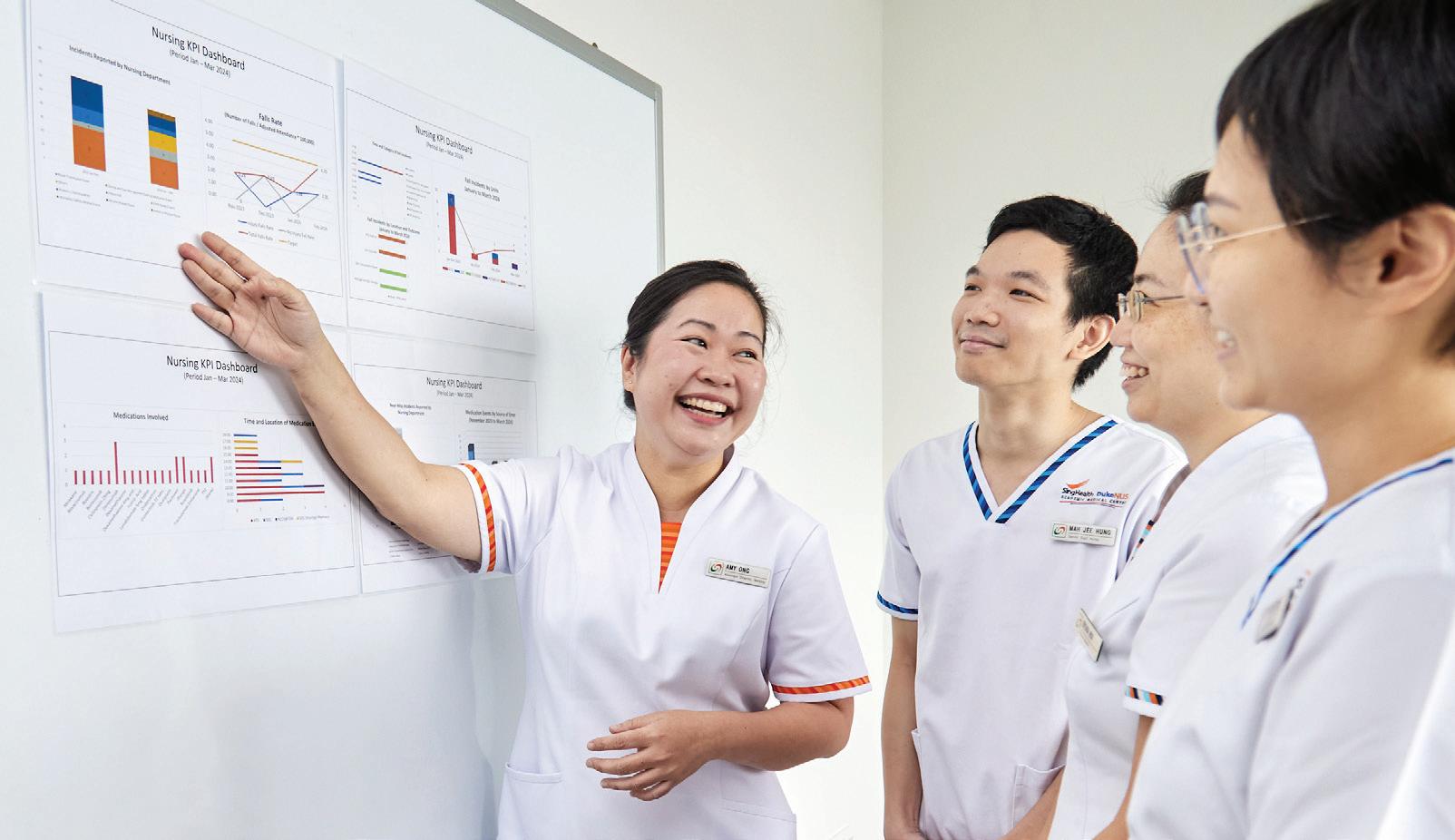
Amy Ong Su Ting
Assistant Director, Nursing National Cancer Centre Singapore
Amy Ong is Assistant Director, Nursing, at the National Cancer Centre Singapore (NCCS). Her role includes leading nursing initiatives that focus on quality, patient safety, healthcare improvement and innovation. She also supports and mentors fellow nurses.
“The healthcare landscape is very fluid and ever-changing, and we always put patients at the heart of all we do. This deeply motivates me to strive to improve patient outcomes, as well as look at ways we can advance nursing and healthcare as a whole,” she said. “My patients also motivate me to do better and be a champion for Target Zero Harm, eliminating preventable harm and delivering the safest care possible.”
Amy’s upskilling journey started early in her career. As a new nurse, she enrolled in an advanced diploma course, then completed her Bachelor’s and Master’s degrees, followed by a Graduate Diploma in Wound Ostomy and Continuous Care. She is currently taking a Graduate Certificate in Patient Safety & Healthcare Quality under the Wee Foundation Scholarship (Leadership).
“As the Quality & Safety Lead in NCCS Nursing, this programme has broadened my understanding of patient safety principles and equipped me with practical strategies to enhance care delivery.”
Amy credits the strong support system she has at work, home and school that has allowed her to focus on her studies and develop her nursing skills. Colleagues and supervisors were understanding; they accommodated her class schedule, and offered advice and encouragement. At home, her husband and mother helped to look after her two children and manage the household.
“Nursing work can be very fast-paced and requires critical-thinking skills. It’s very important to upskill, keep an open mind, accept feedback, and get exposure in various nursing disciplines. Only with exposure would you be able to really know what you want to specialise in, and set personal goals in your nursing career,” she said.
Advanced Practice Nurse & Senior Nurse Clinician
National Neuroscience Institute
Advanced Practice Nurse Tan Il Fan is the nursing education lead at the National Neuroscience Institute (NNI) and works in neurology, with a specific interest in stroke care. Il Fan manages all training and staff development matters, including developing training roadmaps, managing clinical attachments at NNI for students and nurses from other hospitals, as well as clinical and bedside teaching, all alongside her clinical work.
She spends about 20 per cent of her time teaching the Master of Nursing programme at the National University of Singapore (NUS) as the lead on the neuroscience module, which includes providing expert opinion, curriculum planning, setting examination questions, and being an examiner. She is also a sub-committee member in the National Collaborative Practitioner Prescribing programme, which trains and examines nurses and pharmacists on prescribing medications.
As NNI does not have its own inpatient services, its nurses rotate to different hospitals such as Singapore General Hospital (SGH) or Tan Tock Seng Hospital (TTSH), offering consultations and working to standardise neuroscience nursing care across institutions. Much of the team’s time is spent on strategic planning for programme improvements, identifying service and practice gaps, proposing changes to enhance patient safety, and reducing risk to ensure quality of care.
A firm believer in multidisciplinary teamwork, Il Fan not only provides specialist training for nurses in different hospitals, but also serves as a reference point for doctors, allied health professionals, and ancillary staff in delivering comprehensive neuroscience care. One example is Il Fan’s involvement at the new Woodlands Health, where she helps to develop neurology and neurosurgery services while providing neuroscience training for nurses.
Having experienced the challenges of juggling studies and clinical work in the past, Il Fan empathises with her students and junior nurses. She is passionate about guiding them through their learning journey, passing on what she has learnt to help make it less stressful for them.
In NNI, nurse educators like Il Fan retain active clinical work, which complements her role as an educator perfectly. She can tailor her lessons to bridge theory to clinical application by including the latest clinical evidence-based practice to benefit students.
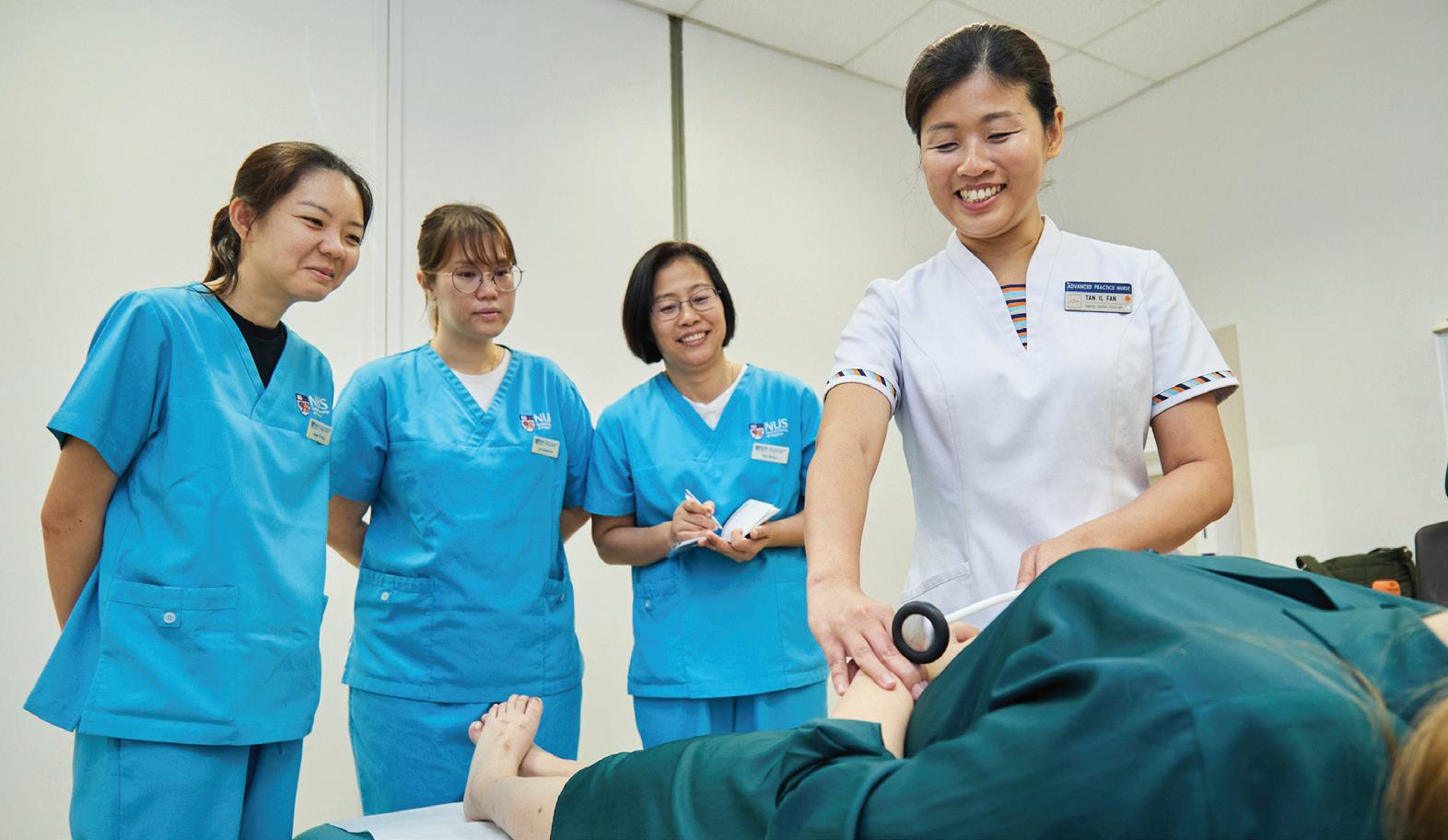
by example, Il Fan continually pursues educational development through courses and workshops to ensure adaptability and innovation in her teaching approach. Recently, she completed a short course on Technology Enhanced Learning, allowing her more creativity to apply technology and gamification into her teaching. Having had opportunities to experience research, education and clinical work, Il Fan has found her passion — education. Her advice for nurses in the early stages of their career is to identify which career pathway best suits them so that they can make their preference known to their supervisors and work towards it. “Nursing is a long journey and a career that offers a variety of fields that you may find interesting, so you must do what you enjoy,” she said.
Senior Staff Nurse
Singapore National Eye Centre
marks Senior Staff Nurse Jason Mok’s 14th year as a nurse. After joining SingHealth as an enrolled nurse in 2010, Jason harboured dreams of becoming a registered nurse, but the missing piece was the academic qualification he needed to be admitted into a diploma programme.
Despite that, Jason’s dedication and clinical skills quickly became apparent. While at the Singapore National Eye Centre (SNEC), he seized the opportunity to advance through a specially designed course for enrolled nurses. This course, which recognised clinical experience over academic qualifications, allowed selected candidates to attend a threemonth bridging programme to qualify for the diploma course. This was a pivotal moment in Jason’s career, enabling him to qualify for a diploma course and, thereafter, a series of academic achievements.
After completing his Diploma in Nursing, he pursued a nursing undergraduate degree from King’s College London, armed with a scholarship by Ngee Ann Academy. His efforts paid off when he graduated with a Bachelor of Science in Nursing with first-class honours. He pressed on in his educational pursuits and attained an Advanced Diploma in Peri-anaesthesia. Currently, he is enhancing his expertise by studying for a Master of Advanced Practice (Clinical Leadership).
Jason’s academic achievements have elevated his professional capabilities. He is now exploring career pathways in innovation, leadership and quality improvement — areas in which his advanced education will be instrumental. His keen interest in leveraging technology and innovation to solve problems and improve efficiency reflects his forward-thinking approach to nursing. “With the ease of access to technology and information, solutions can come from various ways as long as you have an idea and the ability to innovate,” he noted.
Jason’s journey is not just a personal triumph but also an inspiration to other nurses. He advises young nurses to start their learning journey early, capitalising on the momentum from their initial studies to avoid the difficulties of returning to education later.
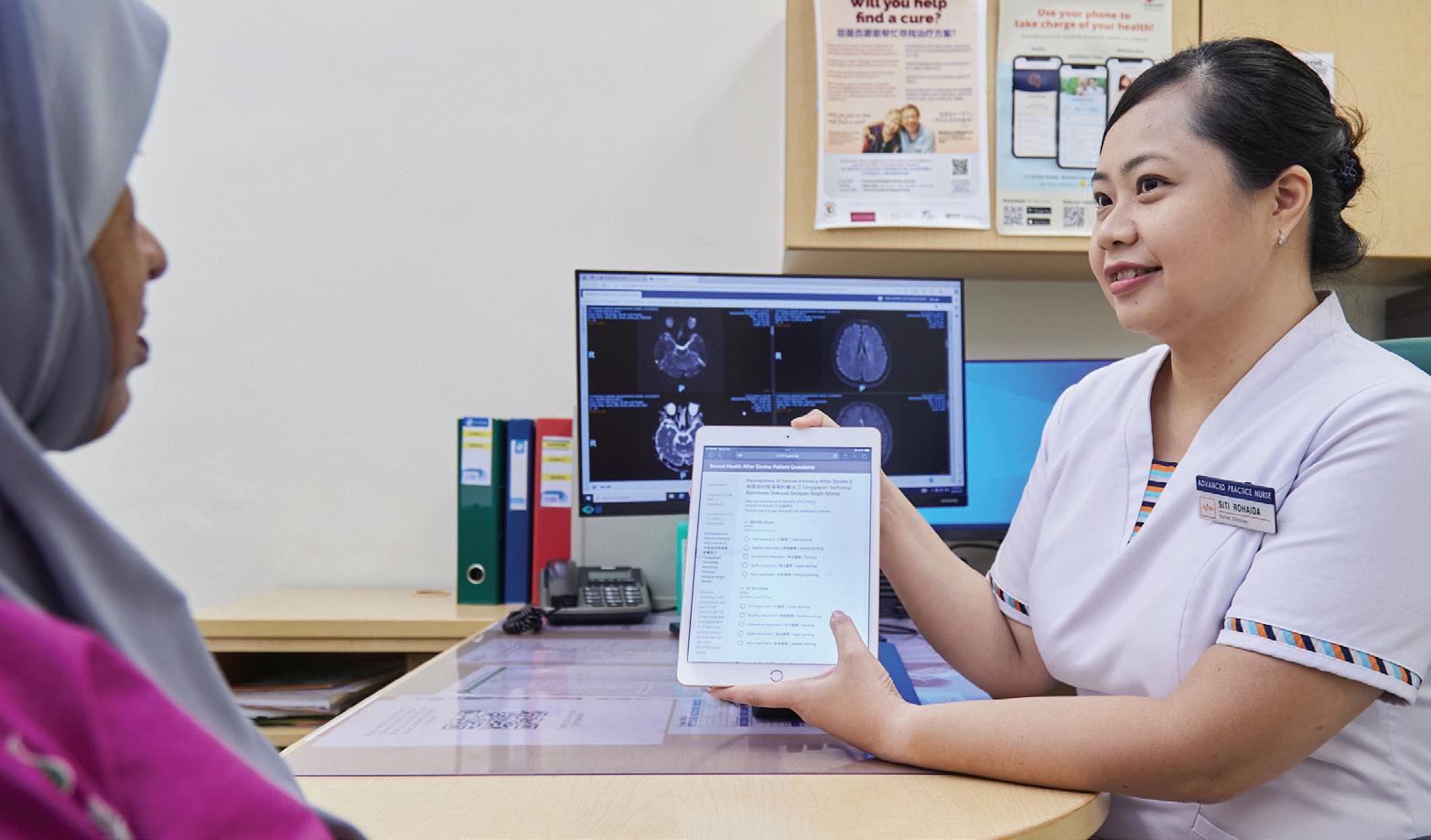
Advanced Practice Nurse & Nurse Clinician
National Neuroscience Institute
Advanced Practice Nurse (APN) Rohaida Rahmat is cross-trained in both neurology and neurosurgery, and is the research lead for nursing. Based at NNI on the Singapore General Hospital (SGH) campus for neurology services, and with her subspecialty in stroke care, she also sees patients with other neurological conditions such as Parkinson’s disease, dementia, and headache in dedicated APNled clinics. In addition, she covers general neurosurgery APN clinic services on the Tan Tock Seng Hospital (TTSH) campus.
Rohaida feels that both the clinical and research aspects of her job are equally important. Having an active clinical load also enables her to channel and recruit patients for her research studies.
Armed with a nursing diploma from Nanyang Polytechnic, Rohaida spent about a year settling into her profession before deciding to enrol for a part-time Bachelor’s degree in nursing. Juggling shift-work with the demands of the course was hectic, but she was in good company as several of her colleagues were taking the same course, and having a group of friends on the journey made things easier.

Four years into her career found her working in a neurology ward. When she expressed her interest in learning more about neuroscience to her supervisors, she was able to take up an Advanced Diploma in Neuroscience Nursing with their support. “Returning to the ward as a neuroscience-trained nurse, I had a better understanding of neuroscience conditions and was equipped with better skills. I was in a better position to guide my junior colleagues,” she said.
Rohaida completed a two-year secondment to the Stroke Services Improvement (SSI) team, under the directorship of the Ministry of Health (MOH), helping to develop initiatives and strategies to improve stroke care across the nation, such as running national public awareness campaigns and facilitating clinical quality improvement measures.
Rohaida has two Master’s degrees, one in clinical leadership and another in adult health nursing, which enable her to practise as an APN. “The Master’s in Clinical Leadership was very helpful when I was doing my stint in MOH as it gave me a better understanding of the entire operational management system within healthcare,” she said.
During her secondment to SSI, MOH, she was exposed to academic writing for the first time, and it kick-started her interest in research. She is currently doing her Graduate Certificate in Health Services Innovation at Duke-NUS Medical School, under the Wee Foundation Scholarship, which, she believes, strongly complements her research work. “With dedicated modules for health services research, the programme has increased my understanding of the research process and allowed me to apply this to my own practice as a research lead.”
The studies through the years have played a crucial part in developing Rohaida’s clinical reasoning, communication and management skills, and her work as a research lead. “Every qualification attained has shaped me into my current role as an APN in Neuroscience, which allows me to make a difference to patients both at an individual and system level,” said Rohaida.
Cheah Le Le
Assistant Director, Nursing (Education)
Alice Lee Institute of Advanced Nursing, Singapore General Hospital
As an educator and administrator at the Alice Lee Institute of Advanced Nursing (IAN), Assistant Director Cheah Le Le is responsible both for the delivery of training courses as well as programme planning. Established in February 1997, IAN was the first Institute of Advanced Nursing to be established in a hospital in Singapore. IAN galvanises the resources, expertise and infrastructure required to support the pursuit of academic and clinical skills training excellence. It has since acquired a strong reputation for being the leading provider of nursing education for nurses here and beyond.
Le Le is also an adjunct assistant professor at the Singapore Institute of Technology / University of Glasgow (UoG). Among the modules she teaches is a foundational elective on teaching, learning and assessment that allows students to explore whether the educator pathway is the right one for them.
Interestingly, Le Le never set out to be an educator. Instead, her work as an educator is grounded in her many years as a clinical nurse where she observed that protocols and processes being taught to nurses could be improved. Also, having gone through many training courses herself, she developed an interest in pedagogy. Education was an effective path to disseminating nursing knowledge, and she felt that seeing theory translated to reality by her students would be incredibly impactful.
This led her to pursue postgraduate studies in higher education. “That’s when the whole world of education really opened up for me and piqued my interest in teaching,” she said. She is particularly glad when she sees learners having a ‘light bulb’ moment, whether in class or at a patient’s bedside. “That’s when you feel really gratified that you have actually helped someone.”
Le Le recently completed a Postgraduate Diploma in Healthcare Management. The exposure to different teaching and learning activities has inspired her, and she hopes to use what she has learnt to help her students enjoy their lessons better, especially adult learners who have not been in a classroom for years.
As a mother of two, Le Le feels fortunate that, throughout her 30-year career, she has had understanding supervisors who supported her pursuit of continuing education. Other than a full-time Advanced Diploma course in critical care, all her other courses were completed part-time while working full-time, and all were fully funded by Singapore General Hospital (SGH).
Many years and courses later, Le Le is still as enthusiastic about learning. She advocates keeping an open mind and always being willing to learn, “as we may not know what we do not know until we start diving into a topic”.
“I abide by the principle of live to learn and learn to live. We learn something every day, but we may not be aware of it. Once we develop this awareness, then we can really enrich ourselves,” she added.
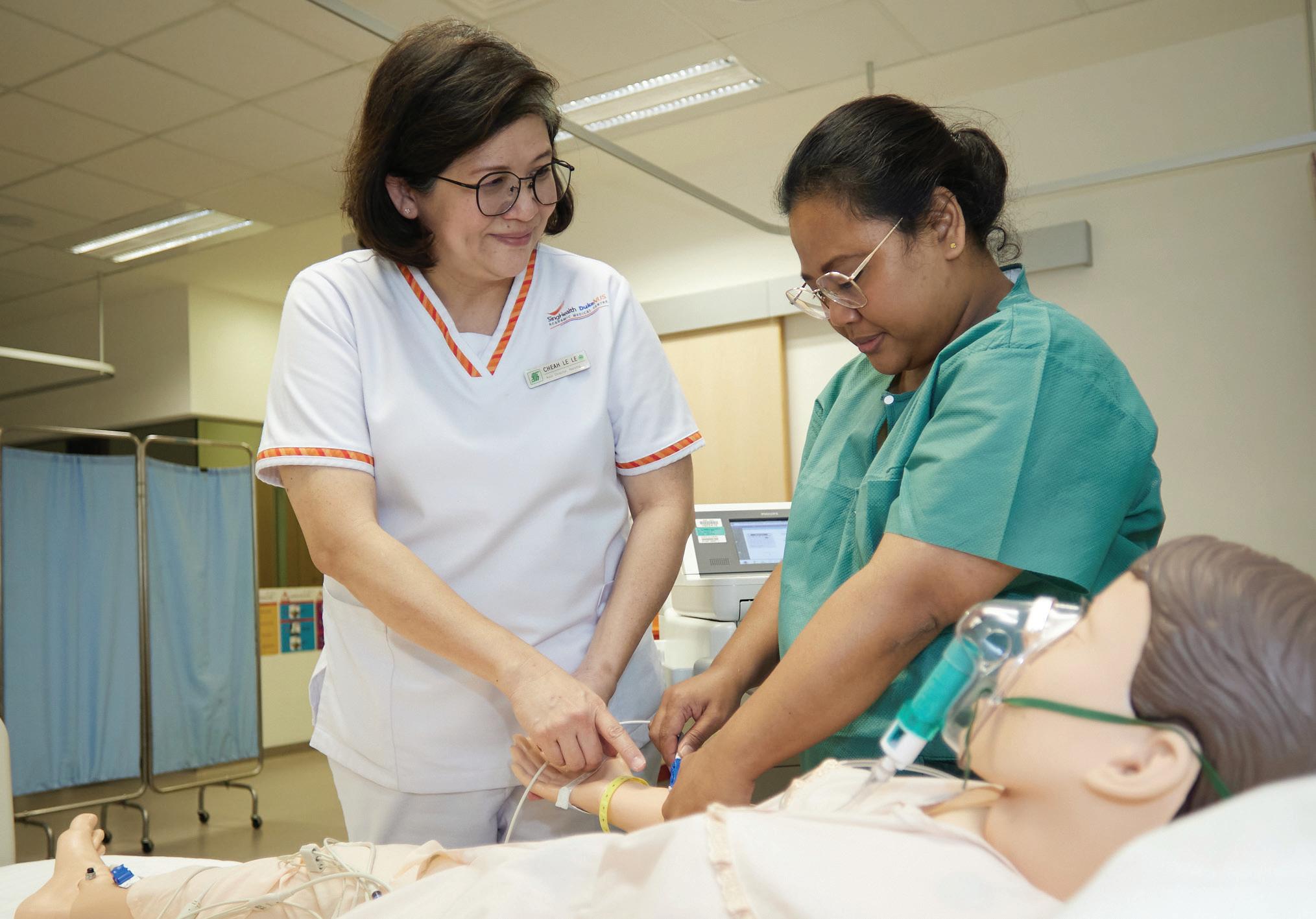
Launched in 2024, the Integrated Bachelor of Science in Nursing (BSN) - Master of Science in Nursing (MSN) programme, offered by the Singapore Institute of Technology (SIT), was developed in collaboration with SingHealth to nurture highly trained specialist nurses and the next generation of nurses and leaders. The SIT Programme Leader, Associate Professor Elaine Siow, who is a nurse by training, shares more.
What drew you to nursing and nursing education?
I was drawn to nursing as I am passionate about caring for others. As a nurse, I am privileged to be given the opportunity to make a positive impact on others, and help them overcome difficulties during their vulnerable moments. I came to understand that the care provided to patients and families can directly influence their recovery.
This gave me a sense of purpose in my job as it is rewarding to be part of their recovery journey, and this is what motivates me to want to stay in this profession.
I was attracted by the diverse and broad-based topics covered in the nursing curriculum, from STEM-based topics to the humanities in subjects like psychology and sociology. During my training as a nurse, I developed a curiosity about various topics in nursing. My lecturers and professors also played a crucial role in my development. Their guidance and mentoring have been integral in shaping my journey as an educator. They are inspiring role models whom I hope to emulate in my nursing career.
Nursing offers a diverse range of career pathways, such as clinical nursing, education, research, leadership, and many others. I see nursing as a profession that allows me to adapt as my interests evolve, from being a clinical nurse to an educator and researcher.
I am pursuing a career in academia because I enjoy interacting with students and hope to inspire the generation of future nurses to provide effective patient care. Academia also enables me to be actively involved in research to contribute to the nursing profession by uncovering new discoveries and generating knowledge that can improve how we care for patients and families.
How does the BSN-MSN curriculum integrate academic learning and clinical residency?
The new integrated programme pathway will enable students to receive two degrees within a shorter period, compared to the current traditional pathway. The Term-In Term-Out approach enables students to engage in authentic learning and apply the skills learned in clinical practice. The MSN portion adopts a work-study framework that enables nurses to gain a deeper understanding of a specific discipline and develop advanced skills.
This programme offers four specialty areas: medical surgical nursing, high acuity care nursing, peri-operative nursing, and community care nursing. This diverse selection enables nurses to select an area of interest based on the needs of the healthcare institution.
Tell us more about your role as a programme leader. The collaboration with SingHealth was valuable in allowing me to bridge the gap between academics and clinical colleagues during the BSN-MSN programme development.
Previously, I spearheaded the development of the SIT-UoG BSc in Nursing (Hons) curriculum by collaborating closely with both SIT and UoG nursing faculty. Through my leadership, we actively sought input from various nursing leaders and clinicians during the curriculum development process. This valuable experience has given me a better understanding of how to lead curriculum design and the amount of effort needed to create a new programme. These skill sets were useful in helping me plan and develop the new integrated BSN-MSN programme.
My current teaching role in the university keeps me up-to-date with advancements in teaching and learning. My teaching experience also helps inform the structure and content of the curriculum, in terms of the pedagogy approaches, assessment methods, and relevance of theoretical and clinical content. I aim to create meaningful experiences for the students and ensure that the programme aligns with learning objectives.
Nursing Care Support Staff play an integral role in the wider healthcare system, assisting to deliver quality care to patients. We speak to three of them to find out what they do and what drives them.
By Candice Cai Photos Vernon Wong
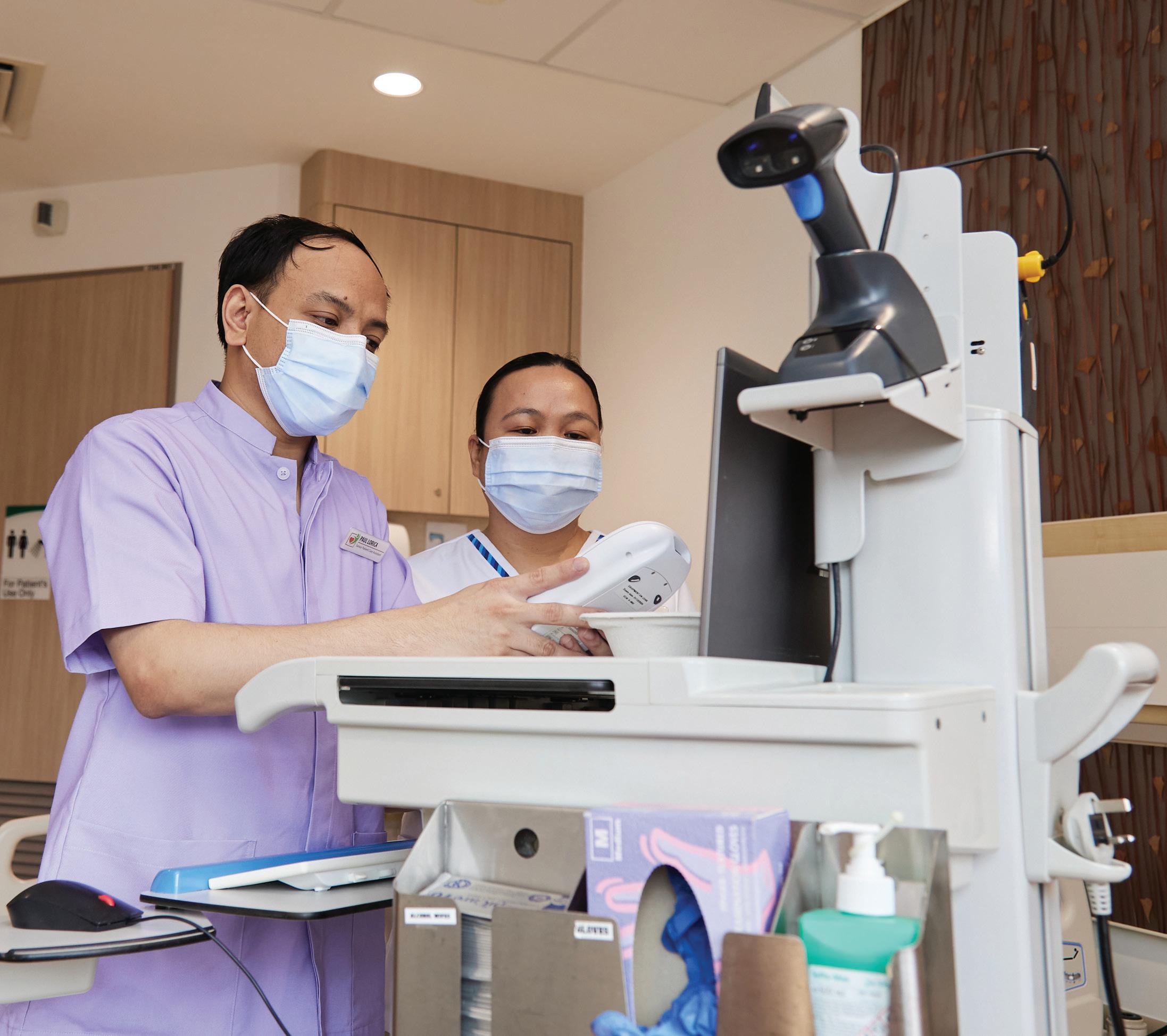
Spreading joy to others
F
ive years ago, Senior Patient Care Assistant (PCA) Paul Ian Lorica, 34, made the decision to move to Singapore from the Philippines to work in Sengkang Community Hospital (SKCH). He wanted to hone his professional skills, enrich his global perspective, and provide a better life for himself and his family.
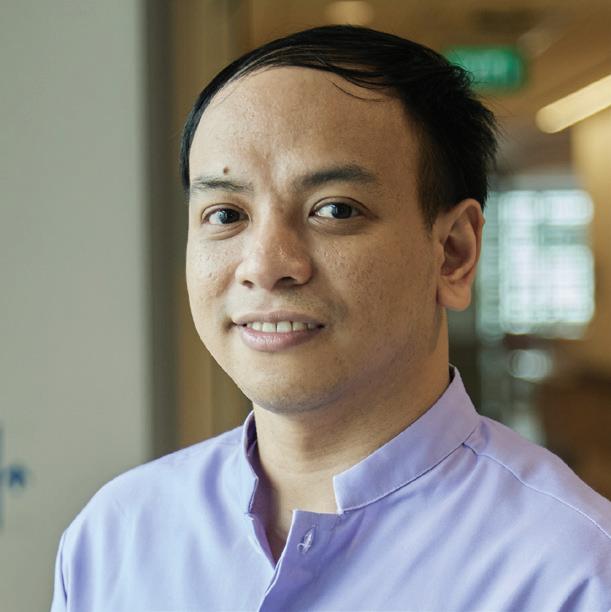
Paul Ian Lorica Senior Patient Care Assistant Sengkang Community Hospital
As a PCA, Paul assists patients at their bedside, helping them with basic activities of daily living such as showering and toileting. He also encourages his patients, many of whom are elderly with dementia, to engage in activities such as horticulture or art therapy organised by the hospital. Paul works alongside the nurses in his ward, “making sure that patients are receiving the best care we can offer as a team”. A promotion last year to Senior PCA also means he has the opportunity to guide newer staff in the same role.
With his jovial personality and
positive demeanour, Paul was quick to adapt to his new environment and form strong bonds with his colleagues, many
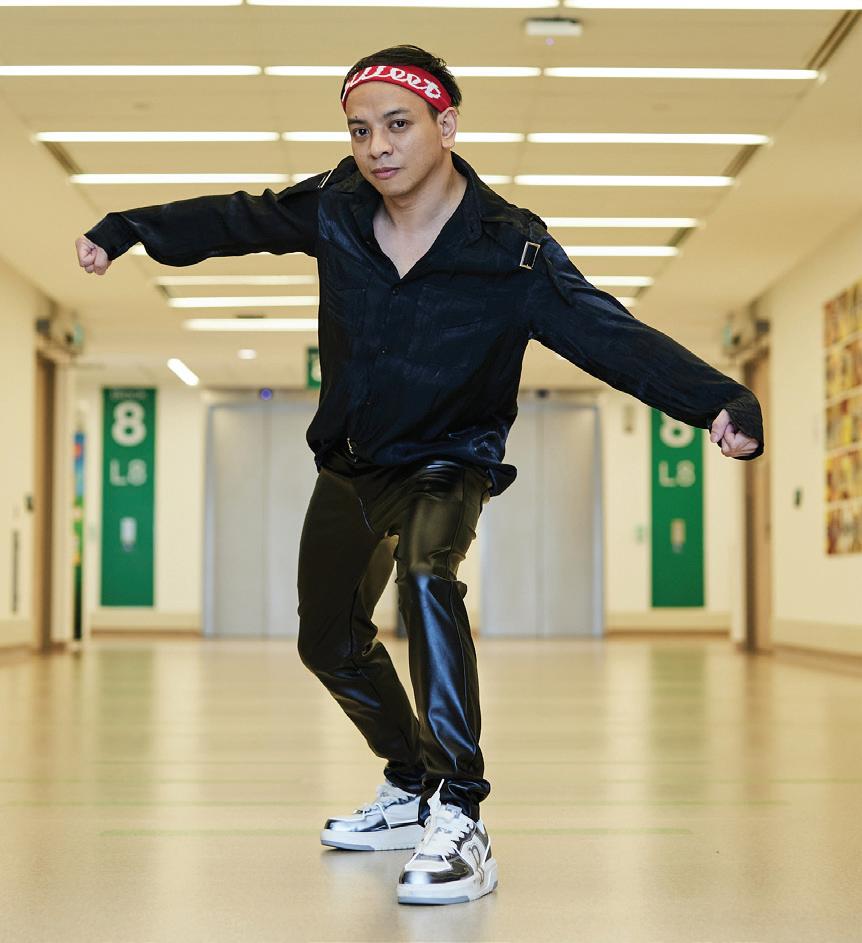
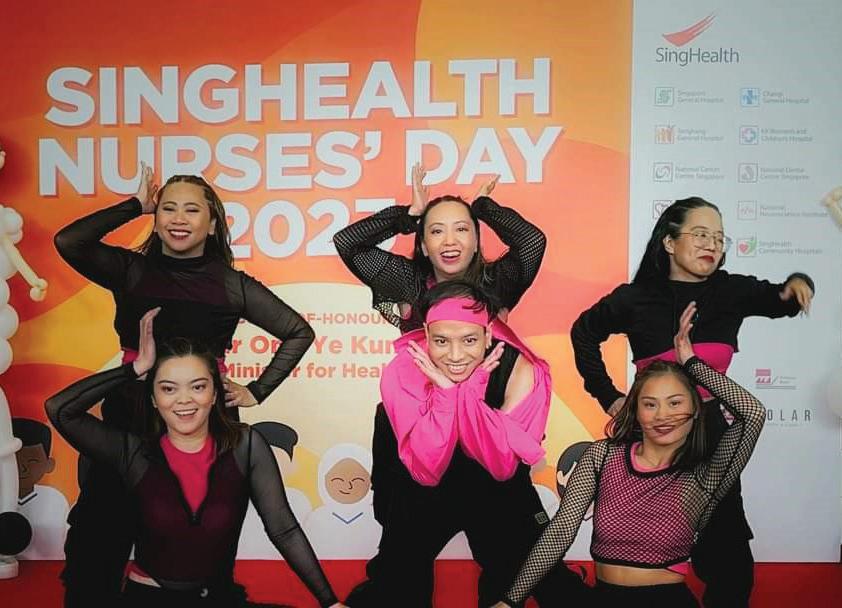
of whom are now good friends. He appreciates the opportunity to work with a variety of nationalities at work, and deems it as a career highlight. He took the initiative to pick up other languages, including basic Malay and Sinhala, to communicate with both his patients and colleagues.
Paul also gives back to others in his unique way. An avid dancer and K-pop fan, Paul has his own YouTube and TikTok channels, and actively participates in many SingHealth events. He also teaches dance to colleagues in his spare time. “It allows us to bond, and I enjoy spreading my happiness to others.”
In his time here, Paul has been presented with several awards, such as the SCH WeCare Award, the COVID-19 Healthcare Hero Award, and the COVID-19 Resilience Award. He takes pride in these achievements, especially as some were due to the positive feedback he had received from patients.
“I’m thankful that my hard work is recognised by my patients, my colleagues, and my supervisor. It boosts my confidence and makes me strive to do more, knowing that all my efforts, big or small, are appreciated,” he said.
Paul advises others not to be afraid to pursue their dreams. “Just be yourself and don’t be afraid to try new things. Stress and challenges can be overcome by forging bonds with others, just as it did for me.”
Providing 35 years of care and support
With 35 years of experience at Singapore General Hospital (SGH), Senior Patient Service Associate Salbiah Binte Seri has seen the hospital change dramatically over the decades.
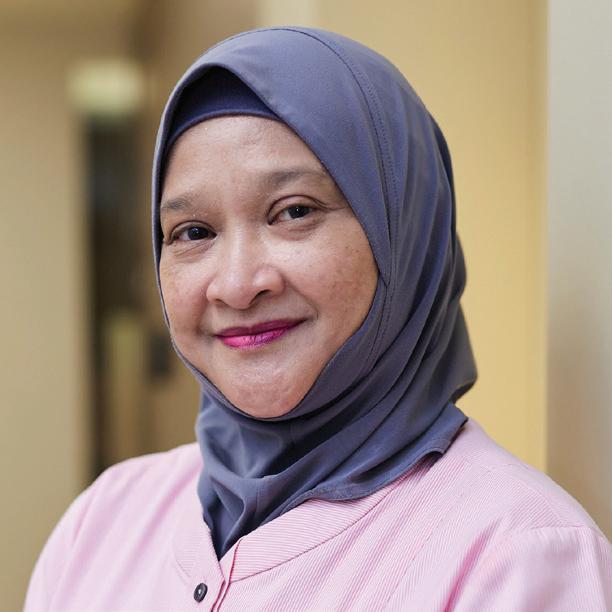
Binte Seri
Senior Patient Service Associate
Singapore General Hospital
For her, it is not just the structural improvements and expansion. She has seen colleagues and doctors she has worked with grow with the organisation and rise through the ranks. SGH’s Chief Executive Officer, Professor Kenneth Kwek, is one of them.
“I worked with him 30 years ago when he was a houseman. I’m so happy and proud to see him as our CEO today,” said Salbiah.
Despite working in the same ward these last few decades, the job is never dull or stressful, said Salbiah. “There are different tasks to do each day, with new patients to attend to. Every day is like a new day to me,” she shared.
Salbiah supports nurses and doctors by ensuring that the daily necessities for ward operations are met, and also in ensuring that patients get treated without delay. Besides administrative tasks such as filing and emailing, she also handles patients’ appointments and enquiries, as well as any ad-hoc duties requested by nursing colleagues.
Salbiah has also taken part in several Quality Improvement (QI) projects. For one particular project in 2020, her team found a way to improve the efficiency of conducting a skin biopsy. The project won a Gold Award. Together with another patient service associate and a nurse clinician, the team brainstormed and tried different methods of collating items required for a skin biopsy. Given the name ‘As Easy as 1, 2, 3’, the team created a special pack that included all the necessary items. This greatly reduced the time spent by nurses to find and collate the individual items, reducing their administrative load.
Her extensive experience means that Salbiah has learned to perform a wide variety of tasks, be it through on-the-job or additional skills training. “Working in the same organisation for so many years has enabled me to better understand the patient’s journey, from admission to post-discharge, and the different work processes by different departments,” said Salbiah, who has weathered both the SARS crisis and COVID-19 pandemic. “The network that I’ve built over the course of my career helps me to facilitate the patient journey,” she added with pride.
What keeps Salbiah going is the relationships she has forged with her colleagues, both nursing and non-nursing, who have grown along with her. “The colleagues who are in senior roles treat me as an equal and value my thoughts and opinions when dealing with administrative processes. I’m also very happy to hear from patients that their hospital of choice is SGH due to their experience and trust. I hope to see SGH scale to greater heights regionally and internationally.”
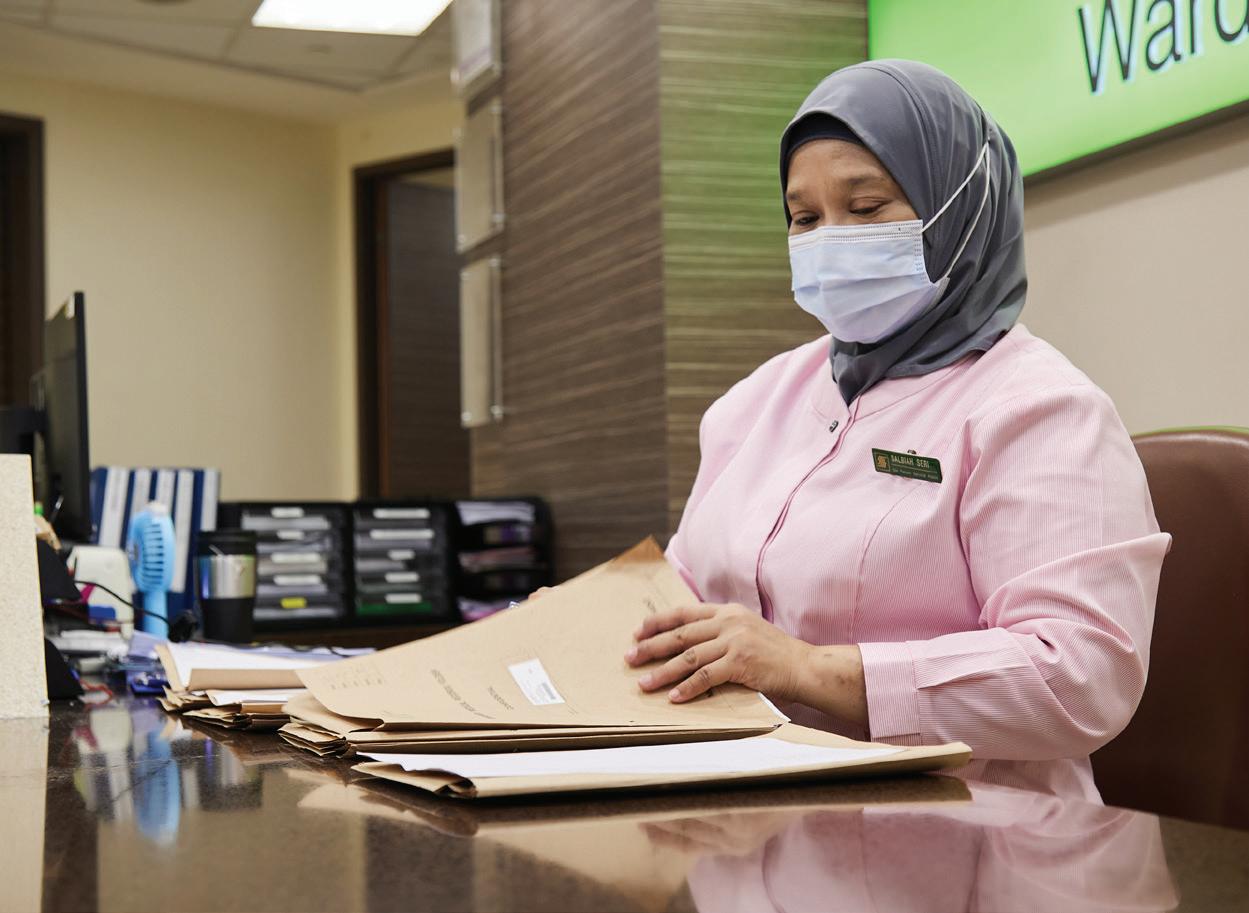
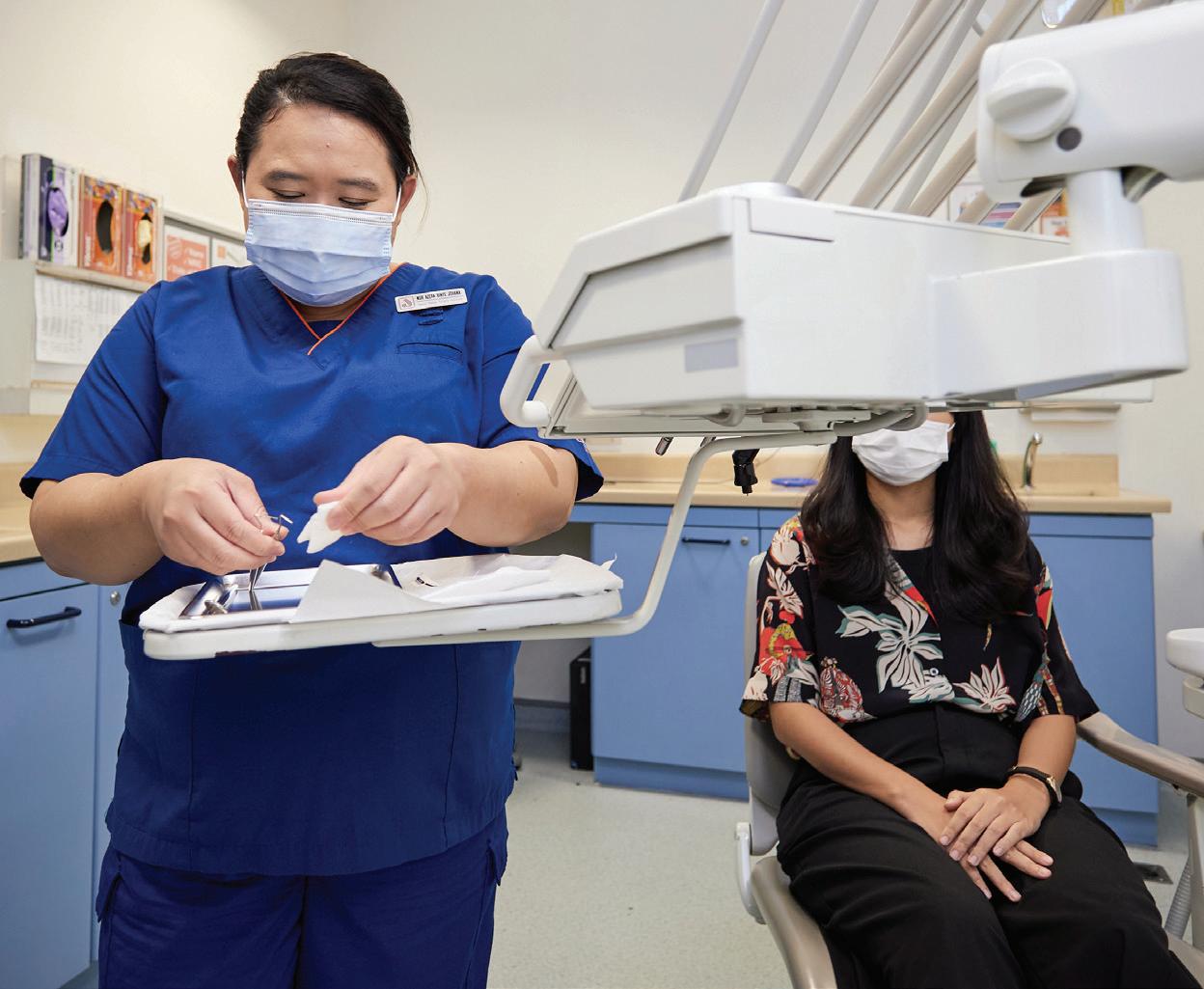
Restoring more than just smiles
Senior Dental Surgery Assistant Nur Azera Binte Johana has been at the National Dental Centre Singapore (NDCS) for 18 years, and it is a job she proudly holds.
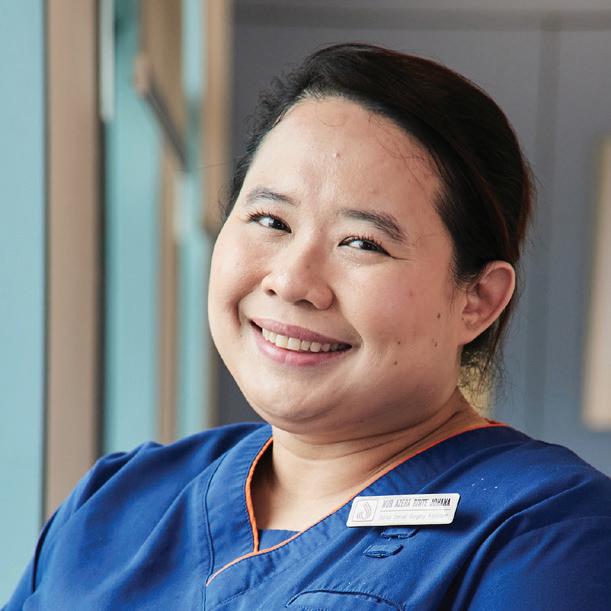
Senior Dental Surgery Assistant
National Dental Centre Singapore
Unlike regular dental assistants, Azera’s role is specialised in the cases she typically deals with. She assists prosthodontists (dentists who specialise in treating complex dental and facial problems) across a spectrum of dental procedures. “We see a lot of patients with facial defects or intraoral defects due to cancer or trauma who require surgery,” said Azera. The goal is to “restore not only patients’ oral health but also their appearance”, she added.
As a senior staff member in the department, she is happy to impart her knowledge to younger colleagues and reassure newer staff, who may be nervous about assisting doctors during surgery.
Described as a hardworking and steadfast worker by her colleagues, Azera is always ever willing to lend a helping hand. With 18 years of experience under her belt, most of her daily tasks have almost become second nature to her.
What motivates Azera is the profound impact her role has on patients’ lives. “Working in the field of maxillofacial prosthetics allows me to be a part of a team that restores not just smiles, but also dignity and confidence to individuals facing significant challenges,” she said, adding that she has witnessed patients tear up after seeing the results of their surgery. One of the youngest patients she has encountered in her work is a four-month-old who needed to be fitted with a prosthetic eye.
Other than helping dental surgeons and patients, Azera also works closely with laboratory staff and nurses in her department to deliver patient care. “It takes many people to make the patient experience seamless for just one person,” she shared.
Azera is proud to be working in the specialised department. “Because this specialty is not something that everyone is exposed to, so to be one of the staff here in this department is an achievement on its own.”
She understands, however, that there are those who may feel intimidated to even consider a job like hers. But Azera feels it would be a missed opportunity. Her advice? “Put those feelings aside and give it a try. You’ll realise that when you see your patients go through the process and the different emotions — from being sad and down to coming out of treatment with the prosthesis and renewed confidence — it will give you a sense of satisfaction.”
Although Norul Izzi Binte Abdul Samad and Duong Nguyen Bao Khanh face some challenges, it has not quelled their passion for nursing. Instead, they found ways to handle their stressors, bringing about both job satisfaction and fulfilling personal lives.
By Candice Cai Photos Vernon Wong
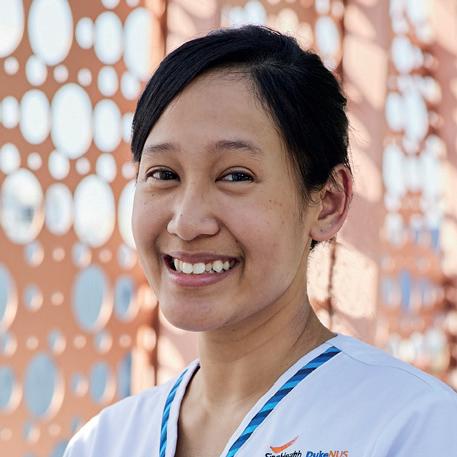
Norul Izzi Binte Abdul Samad
Senior Staff Nurse National Heart Centre Singapore
Having her second child four years ago was a joyous time for Senior Staff Nurse Norul Izzi Binte Abdul Samad. But managing two children under two years of age soon took its toll, especially when it came to her career.
Izzi, now 35, was then with the Cardiothoracic Intensive Care Unit (CTICU) of the National Heart Centre Singapore (NHCS); it was her first job since entering the nursing profession in 2009. She grew to love the fast-paced environment. “I enjoy the adrenaline rush,” said Izzi. “The challenges of work were manageable but, as I made the transition to being a mother of two, it proved to be a bigger hurdle.”
“Managing a toddler and a baby on top of shift work was overwhelming for me,” said Izzi. She wanted to breastfeed her baby but found it difficult due to
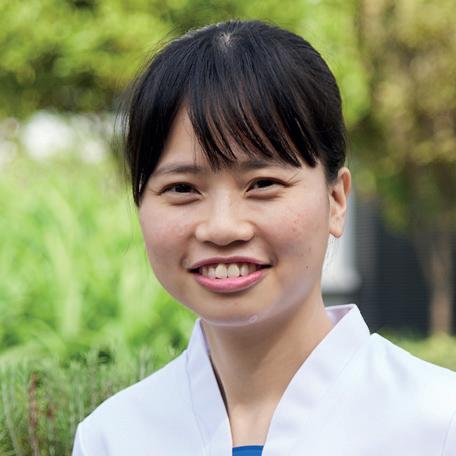
Duong Nguyen Bao Khanh (Vivian)
Staff Nurse Sengkang
Community Hospital
Hailing from Ho Chi Minh, Vietnam, Vivian came to Singapore in 2016 on an Asian Nursing Scholarship. However, the 22-year old was hampered by her poor English. “I wasn’t able to articulate my thoughts well enough to those around me, which led to misunderstandings,” recalled Vivian of the trying time she had as a nursing student. “I didn’t have the confidence to speak up, and this affected my ability to pick up the right skills and techniques.”
Although she failed her internship twice, Vivian did not give up. She decided that, for her third and final internship, she would improve her language and communication skills through self-study while balancing work. Prior to her shifts, she allocated time for self-study, and familiarised herself with her patients’ diagnoses and the names of their medications. She learnt to ask for help
her work schedule. “After work, I would manage the household chores such as cooking because I wanted to give my toddler home-cooked meals. But it became overwhelming.”
Izzi considered giving up nursing to focus on being a stay-home mother. “I enjoy nursing a lot and the independence from earning an income. On the other hand, I also thought that I should stay at home to take care of my children. After all, money can’t buy my children’s growing up years,” she shared.
Izzi considered taking on a less demanding role in another hospital and department but realised that she really enjoyed working in the CTICU — it was where she started as a nurse, so she found it difficult to leave. She decided to confide in her supervisor, Senior Nurse Manager Yeoh Lee Shien. “I asked if it would be possible to work three morning shifts a week which I felt was more manageable.”
Sister Yeoh was more than supportive, and Izzi made a switch to part-time work instead. “I was so touched that she personally made the arrangements with our bosses, including the chief nurse, to
and even conducted her own additional research. Having overcome her inhibition to communicate with others, she passed her final internship.
Vivian credits her preceptor at Bright Vision Community Hospital for turning things around. “She was friendly and guided me with a non-judgemental attitude, making it comfortable for me to open up to her,” recalled Vivian.
Vivian went on to secure full-time placement at Sengkang Community Hospital (SKCH), where she benefited further from her preceptor, Senior Staff Nurse Sarena Binte Rahim, and her then-supervisor, Nurse Clinician Kitty Ho. Both colleagues taught Vivian the ropes while taking time to understand her as a colleague and friend. “They knew that I was sometimes unsure of which work to prioritise, so they’d guide me to organise my workload efficiently. With her experience in the emergency department, Sister Kitty also taught me what I needed to do if the patient’s condition worsens,” said Vivian.
The nurturing of her nursing educators sparked a desire in Vivian to grow her knowledge and improve her critical thinking skills. With the support of her
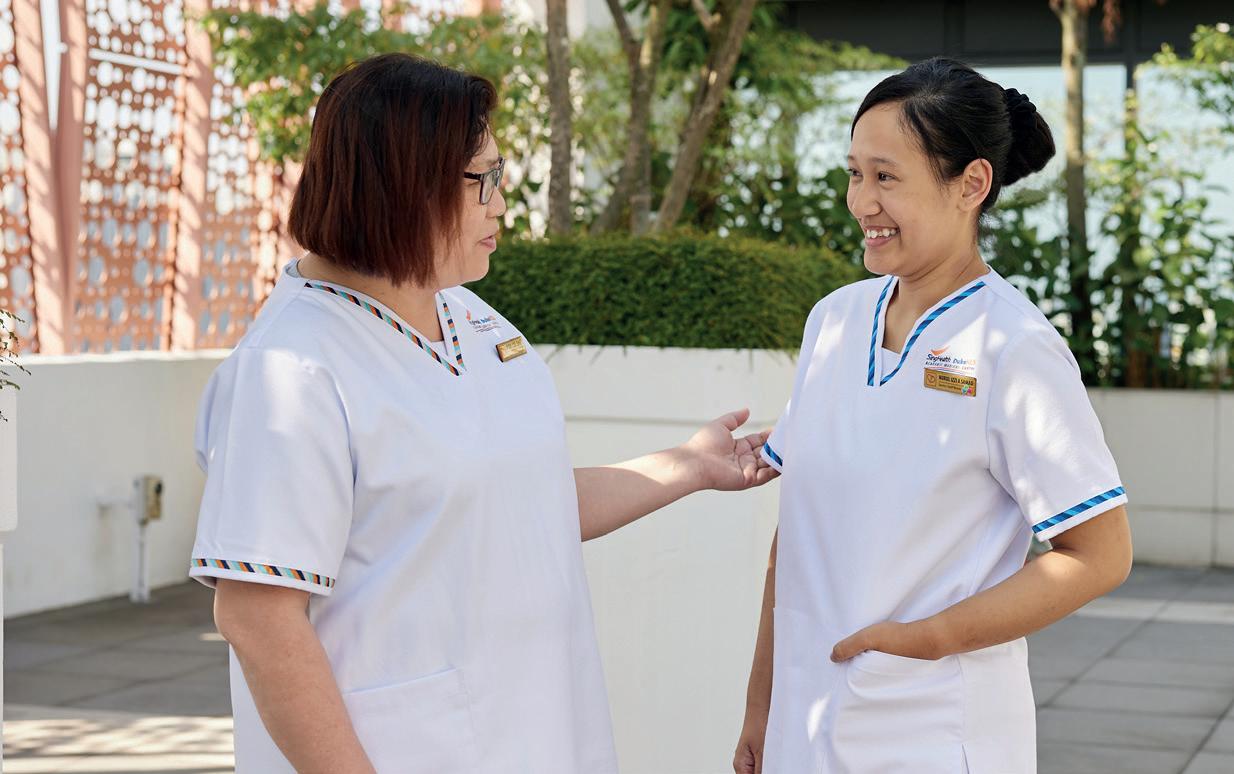
allow this change,” said Izzi. “I thought that my only option was to leave.” Now with three children, Izzi has struck a happy balance between family and career with part-time work. The experience has taught Izzi an important lesson: “If we share our vulnerabilities, people around us are willing to help. Sometimes we are just scared and unsure, thinking there’s only one solution.”
Izzi treasures these close relationships at work, and sees them as blessings in this season of her life.
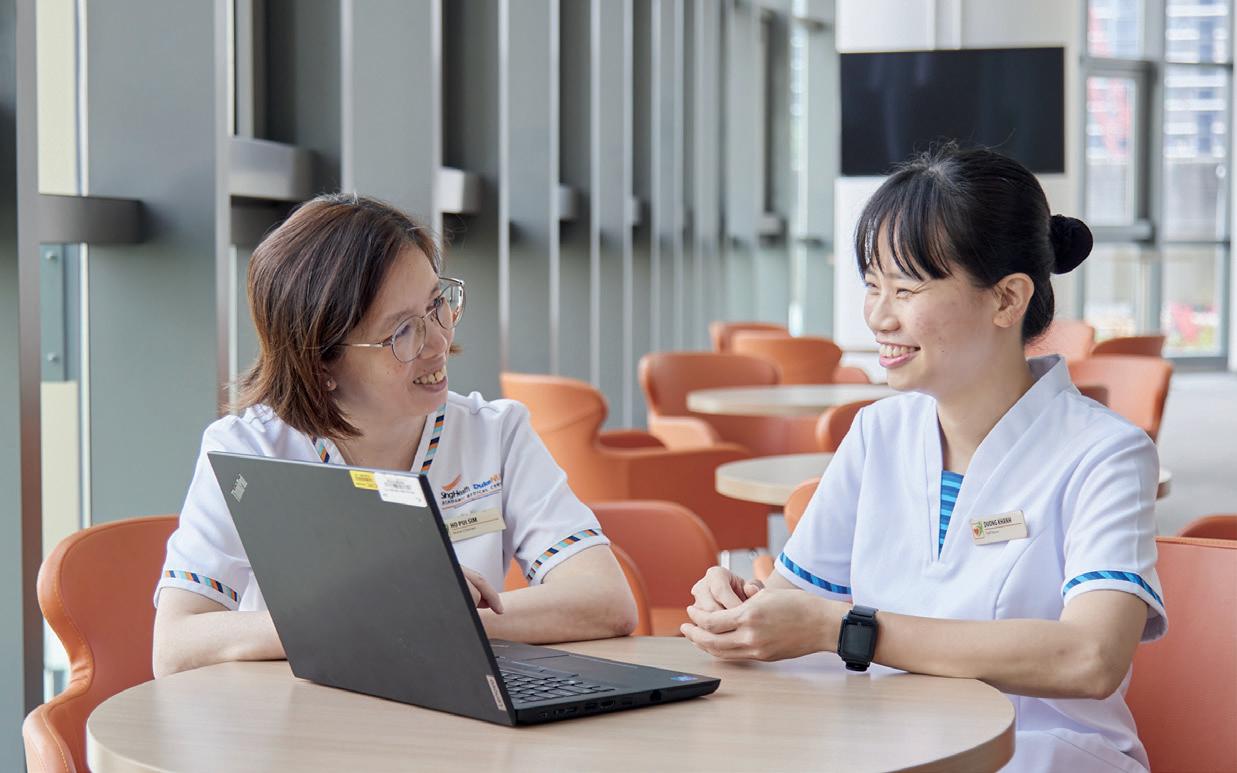
current supervisor, Nurse Clinician Yvonne Shi, she decided to take up a nursing degree, which she is currently pursuing. Vivian is inspired by her advice to “look for improvement and not perfection”.
Vivian has the support of colleagues in the ward, who adjusted the roster to accommodate her studies. Being far from her family and homeland, this camaraderie is priceless to Vivian.
“My colleagues have not only sparked my own personal growth, but have also inspired me to be a better nurse, to deliver care well, and to serve patients to the best of my abilities.”
The Centre for Global Nursing aims to build collaborative, long-term relationships to co-create meaningful, pragmatic and sustainable nursing solutions in regional countries.
By Goh Bee Lian Photos Vernon Wong
For the last two decades, SingHealth has been involved in various global health initiatives that are at different levels of maturity. Many existing collaborative programmes were initiated with the establishment of the SingHealth Duke-NUS Global Health Institute in 2018.
Against the backdrop of the burgeoning interest in global health programmes comes the launch of the Centre for Global Nursing (CGN). CGN emerges as a nexus for collaboration and joint research worldwide, and nurses are invited to be part of the journey to advance healthcare excellence on a global scale.
“The projects that we currently have gave us a very strong reason to ringfence all of them under one entity as CGN,” said Associate Professor Sabrina Koh, Head of
CGN. With the pooling of resources and nursing expertise, the centre serves as a central body for curating and delivering bilateral nursing programmes for regional and international nurses.
CGN will build collaborative, long-term relationships to co-create meaningful, pragmatic and sustainable nursing solutions.
This opens opportunities for SingHealth nurses to make a difference beyond their local context, enriching their perspectives on different healthcare systems and the impact of the sociopolitical-cultural environment on health and the nursing workforce of the country. CGN will serve as platform to engage with nurses who are interested in international work. “With CGN, nurses have access to the world to make a difference with their
knowledge and expertise,” said Sabrina. “They can bring the skills of patient care delivery that they have developed over the years and apply them in global settings, collaborating with our counterparts in the region to raise the standards of nursing care.”
CGN’s vision is to set up systems that are sustainable for the host countries to run and develop. “Our focus is on mutual empowerment and not just short-term, unidirectional learning,” said Sabrina.
The virtual centre will organise training programmes covering topics specific to global nursing. Cultural awareness elements will be embedded in different modules. For instance, in the areas of research and innovation co-development, participants will explore frugal innovation that is sustainable for the country.
China
• Beijing: Peking Union Medical College Hospital, Tsinghua University and 21 other institutions
Myanmar
• Yangon Hospitals and 17 other institutions
Nepal
• Chitwan Medical College Teaching Hospital and 29 other institutions
India
• Tamil Nadu, Ministry of Health
• Chengdu: West China Medical Center Sichuan University
• Chongqing: Chongqing General Hospital
• Shanghai: Renji Hospital
Taiwan, Republic of China
• Chang Gung Memorial Hospital
Cambodia
• Calmette Hospital
• Khmer Soviet Hospital and University Health Sciences
• Kosamak Hospital
• Technical School of Medical Care
• Cambodia Physical Therapy Association
• Paro Hospital and 22 other institutions
• GNRC Hospitals, Assam Sri Lanka
• Jaffna Teaching Hospital
• University of Jaffna
• National Hospital of Sri Lanka
Vietnam
• National Children’s Hospital
• National Institute of Hematology and Blood Transfusion
• VINMEC International Hospital
• Hue Central Hospital
• Blood Transfusion and Hematology Hospital
• Children’s Hospital 2
• Angkor Children Hospital
• Preah Kossak
Indonesia
• Primaya Hospital Group
• Siloam Hospital Group
• Bali International Hospital
Australia (Strategic Partnerships)
• Perth: South Metropolitan Health Service; Curtin University
• Sydney: University of Sydney
Associate Professor Sabrina Koh
Head, Centre for Global Nursing; Deputy Director, Nursing Sengkang General Hospital
By her second year of nursing studies, Sabrina knew that she wanted to be an educator. “I like education so much that I never once felt disheartened or regretted my choice. That’s something that I feel heartened about,” she said.
When she was undergoing clinical training as a student, Sabrina recalled that she wanted to see how anaphylaxis, a severe life-threatening allergic reaction, looked like. But, of course, there will never be an anaphylaxis case to study at leisure while the patient is in danger. “Simulation provides a realistic environment for learning without harm to the patient,” she said.
Simulation is one area that Sabrina’s team is helping to build capacity for a regional counterpart. They have created fellowship programmes that prepare trainers to design scenarios for students and conduct debriefing after the simulation exercise.
As an active simulationist, Sabrina’s education-related activities include
Pham Thi Ngoc Anh
I like education so much that I never once felt disheartened or regretted my choice. That’s something that I feel heartened about.
developing and training in clinical workflows, patient safety, teamwork and communication. Another area of passion is simulation faculty development, which can cost up to US$2,000 for a three-day programme in the United States. Many nurses in the region cannot afford to attend these courses, so she volunteers in countries like India, Malaysia and China to deliver such courses.
“Through CGN, we now have a stronger base to build global partnerships and create programmes that build nursing capability and capacity, and strengthen health systems through education, research and innovation,” she affirmed.
Institutional Global Nursing Lead, KK Women’s and Children’s Hospital Campus; Advanced Practice Nurse & Senior Nurse Clinician
KK Women’s and Children’s Hospital
Having worked as an oncology nurse for more than 19 years, Advanced Practice Nurse (APN) Pham Thi Ngoc Anh has been involved in numerous educational exchange programmes that support nursing education, with nurses from different parts of the world — including Vietnam, Myanmar and the Philippines — coming to Singapore for training.
Her journey in global nursing started in 2018. The University of California, San Francisco, worked with the Haematology/ Oncology Service at the KK Women’s and Children’s Hospital (KKH) — which it already had ties with — to develop a programme for training doctors and nurses to be implemented in Vietnam.
Appointed project lead for the nursing track, Anh, together with her American nursing counterparts, developed the educational programme for basic oncology nursing based on wellestablished global practices.
Initially, Anh used her personal time for this. Since the formalising of the global nursing framework, her supervisors have provided her dedicated time to pursue this project. She also translated the training
It takes a lot of time and effort to build up this programme, but I am very happy with the progress that we’ve made. We are witnessing the difference that we have made for the Vietnamese nurses and patients as well.
materials into Vietnamese.
When COVID-19 struck, face-to-face training sessions went virtual, which has continued to this day, and is usually conducted once a month. 13 nurses from cancer centres across Vietnam attended the first training session; these virtual meetings are now attended by 100 to 200 nurses per session in Vietnam.
“It takes a lot of time and effort to build up this programme, but I am very happy with the progress that we’ve made. We are witnessing the difference that we have made for the Vietnamese nurses and patients as well,” said Anh.
To build something sustainable requires funding. The Singapore team has been assisting their Vietnamese counterparts to tap on non-governmental
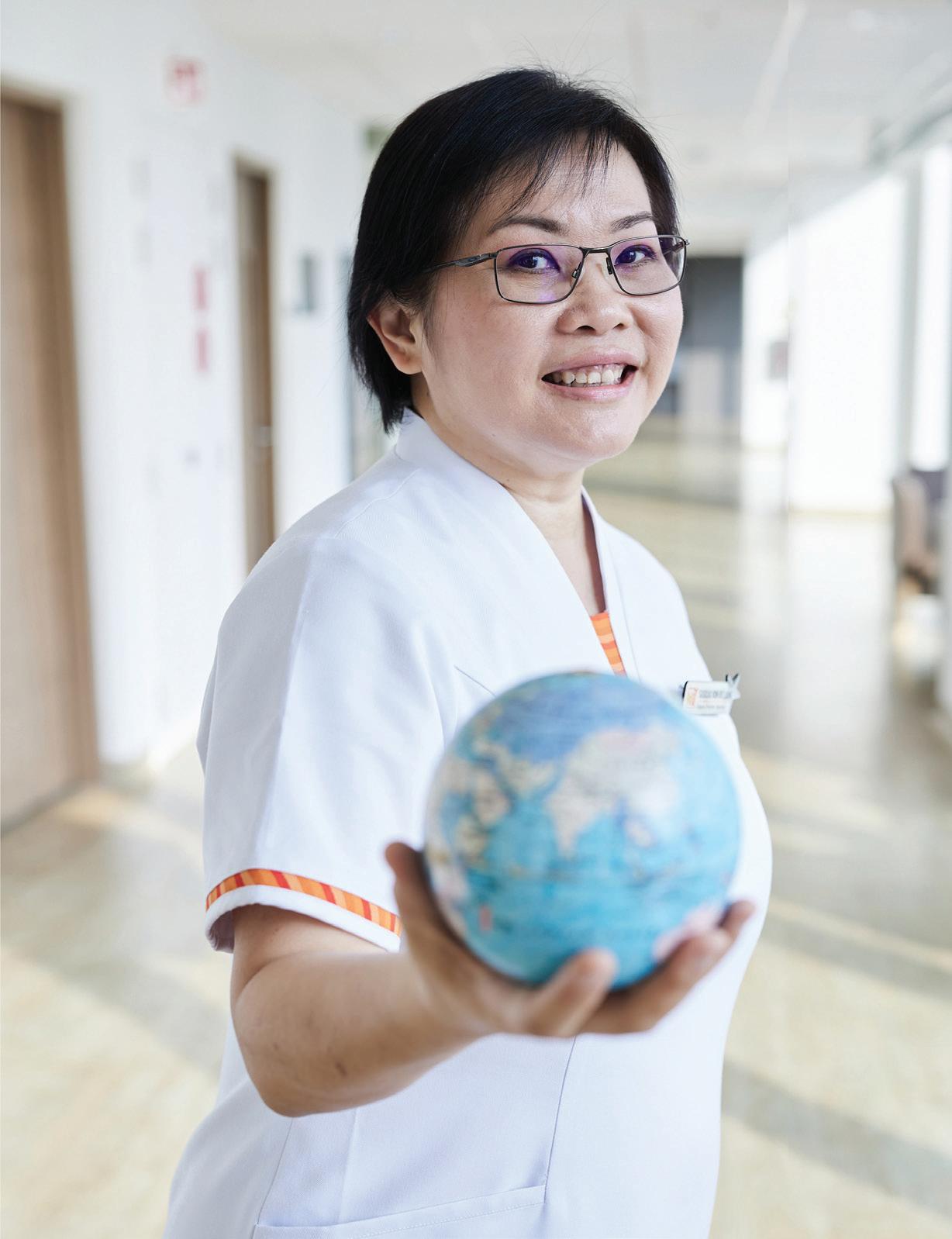
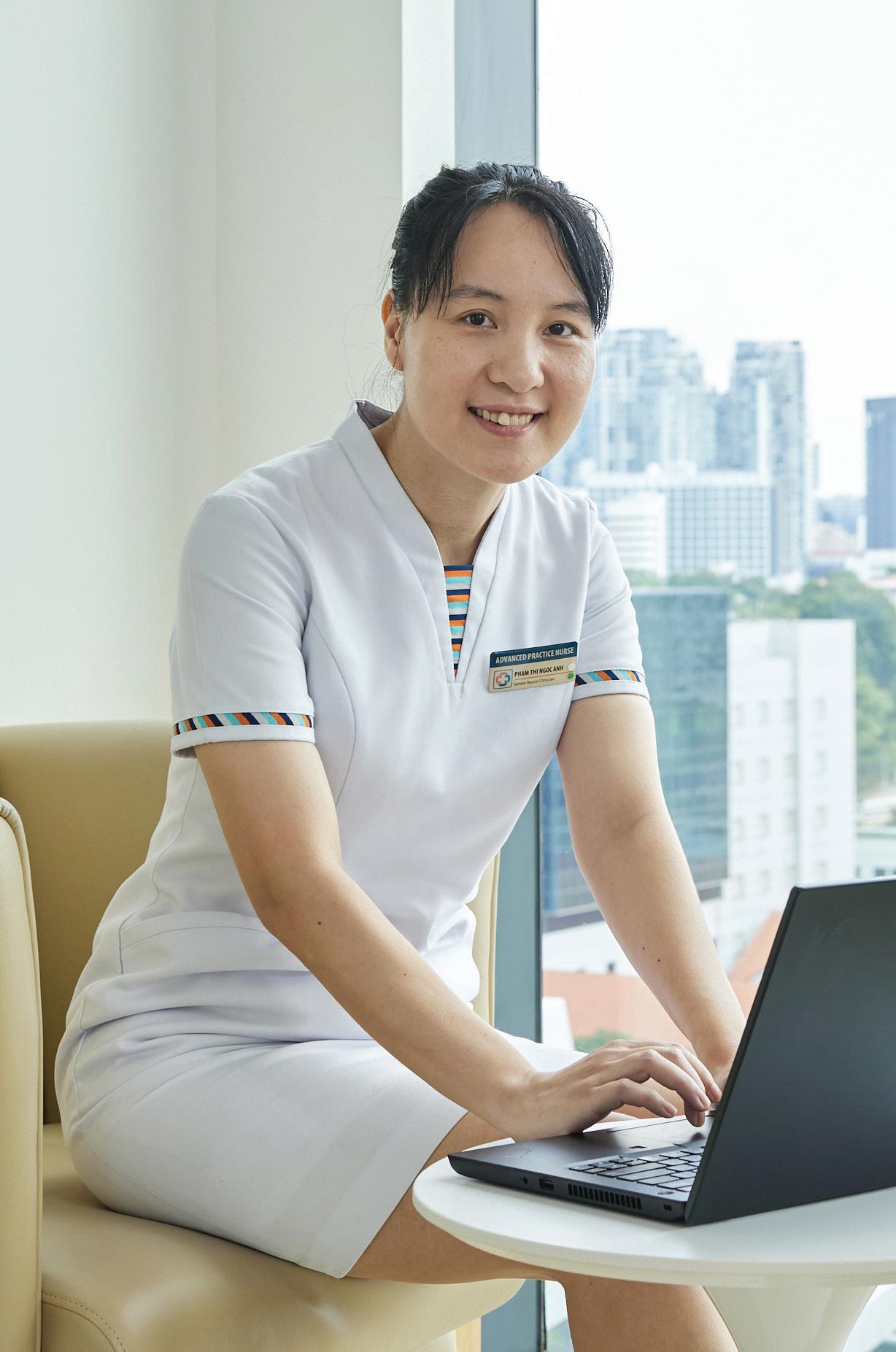
organisations (NGOs) for funding and supporting them to present their work at international conferences to increase their visibility. “I see myself more as a mentor nowadays. Instead of us doing the teaching, we redesigned our programme to schedule case-based presentations, which will be delivered by the Vietnam nurses,” shared Anh.
Anh came to Singapore at the age of 18 and took up nursing because she happened to see the course offered. She
has stayed on because she finds meaning in her work. She also feels fortunate that new opportunities opened for her at the right time, allowing her to progress from being an inpatient nurse to a nurse specialising in childhood cancer, to an APN and, subsequently, a transplant nurse. “Every day, when I come to work, I see myself making a difference. That’s the most important thing because, no matter what, I know the meaning of what I’m doing,” she said.
Cluster Global Nursing Liaison Person; Director of Nursing & Advanced Practice Nurse
National Neuroscience Institute
When Clinical Assistant Professor Ng Wai May was approached by neurologist Professor Umapathi N Thirugnanam of the National Neuroscience Institute (NNI) for nursing volunteers to help build up neuroscience capacity and capability for medical workers, nurses and allied health professionals in Yangon, Myanmar, she was quick to sign up.
As the interest level was high, a team of similarly passionate colleagues was formed soon after. Not only were the team members willing to volunteer their time and expertise, they also decided to foot their own travel expenses and use their annual leave for the project trips in the early stages as there was no formal agreement for this initiative. “It’s really about the heart, as we see meaning in this project,” said Wai May.
This is just one of the global nursing projects that Wai May is actively involved in. Her current project is Project BRAIN –Building nuRses cApability In JaffNa. This project was inspired by Clinical Assistant Professor Jai Rao, who wanted to improve neurosurgery care in Jaffna Teaching Hospital. As part of their work in Jaffna, Sri Lanka, the team roped in a physiotherapist to develop videos on how caregivers can help to mobilise their loved ones to prevent complications and hasten recovery.
“Caring for patients is a team sport; it’s not just physician-focused or nursingfocused. This is interdisciplinary work that we are doing together to improve patient care,” added Wai May.
On-site needs assessment is crucial, Wai May noted, as conditions in different countries vary widely. In some cases, the training needs indicated by the partners were found to be unfeasible as the nursing care had to be strengthened first. In contrast, some other countries were quite advanced and sought support in innovation and research. “We need to
Caring for patients is a team sport; it’s not just physicianfocused or nursing-focused. This is interdisciplinary work that we are doing together to improve patient care.
cater to the different countries’ needs and work out an individualised plan for the specific country because infrastructures are different, resources are different, everything is different. We have to collaborate, innovate and work within their available resources,” said Wai May.
Witnessing vastly different patient care situations is also an educational experience for the visiting nurses, with abundant, bidirectional learning opportunities. Each country’s unique challenges present opportunities to develop innovative solutions. For example, thickeners and cans of milk are readily used in Singapore for patients who need tube feeding, but nurses in Sri Lanka use cow’s milk for tube feeding and yogurt for patients with dysphagia.
For Wai May and her teammates, it was very exciting to experience new things. “I love it because we start to see different perspectives. These countries have very enthusiastic nurses; I love their attitude, their can-do spirit,” she shared.
Apart from neuroscience training, other topics such as nasogastric tube feeding, tracheostomy care, and skincare are also very much of interest.
Plans are underway for the BRAIN project team to work with the University of Jaffna to develop short courses on stroke and head injury, which are two areas of need identified by the university’s Dean, Professor Surenthirakumaran, and Senior Nursing Lecturer, Jegapragash. The team is also working closely with partners at Jaffna Teaching Hospital, Professor Sathiya and Chief Nurse Malar. Team
Anh views global nursing as new and exciting. While a good day of work used to mean ensuring her patients were well taken care of and seeing them recover, she can now see patients beyond her care getting better, which drives her to do more. “As experienced nurses, it’s up to us to elevate the profession and take nursing care beyond Singapore. I am very confident that Singapore’s nursing standard is among the top in the world. It’s up to us to put Singapore on the healthcare map.”
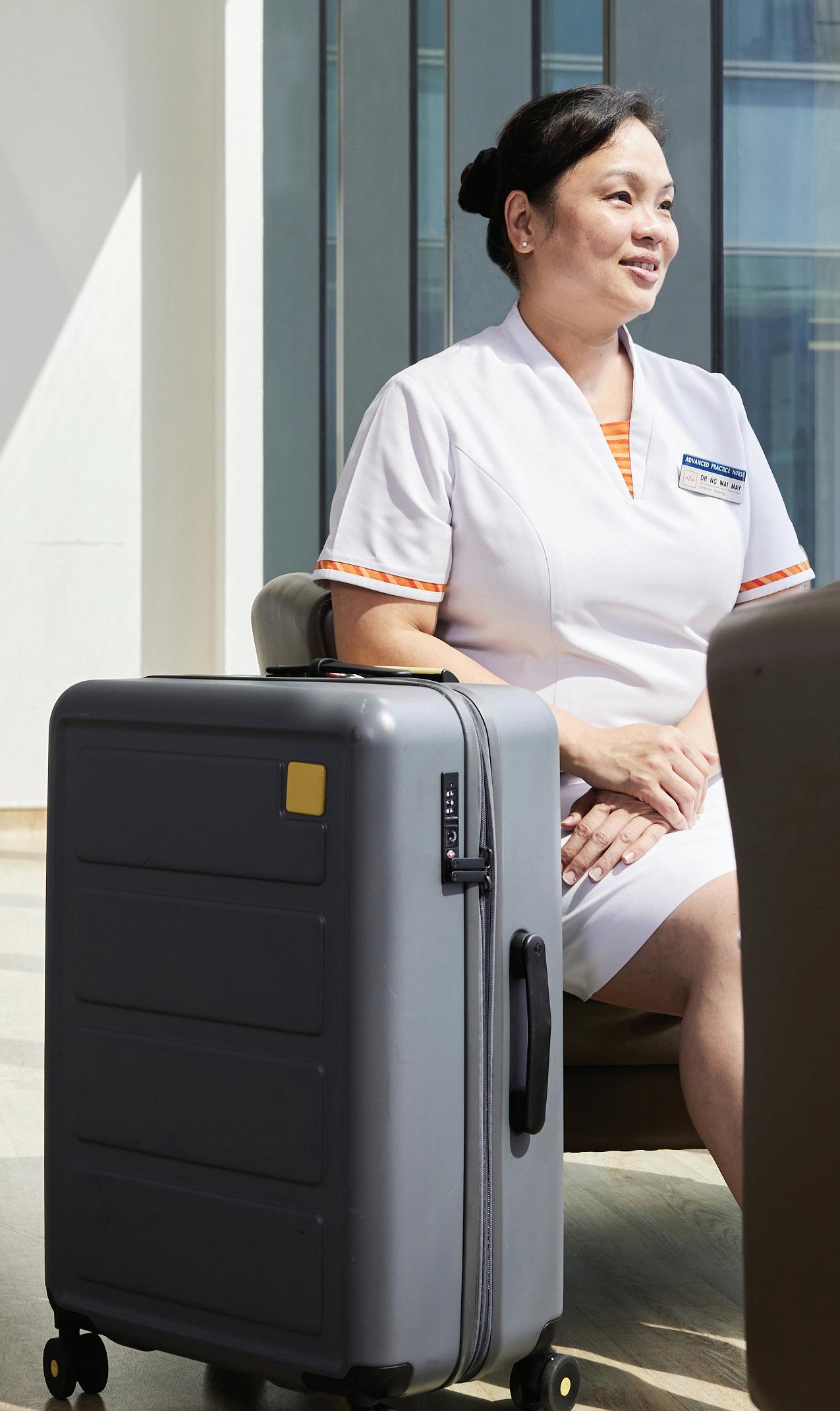
BRAIN will be training selected members of the Jaffna nursing team at both the university and teaching hospital to equip them with the essential skill set to train other nurses there.
Among the multiple hats she wears, Wai May is Co-Clinical Director of the SingHealth Duke-NUS Institute for Patient Safety & Quality. But global health is something that she will still make time for.
“It’s the passion and the satisfaction, the love that you have, that will drive you to do work,” she said. “You don’t see it as work; you see it as really helping others.”
Two SingHealth Nursing students chat with Changi General Hospital’s Assistant Director Punithavathi (Sister Puni) over a game of Jenga to learn more about her life as a nurse.
By Chua Kim Beng Photos Vernon Wong
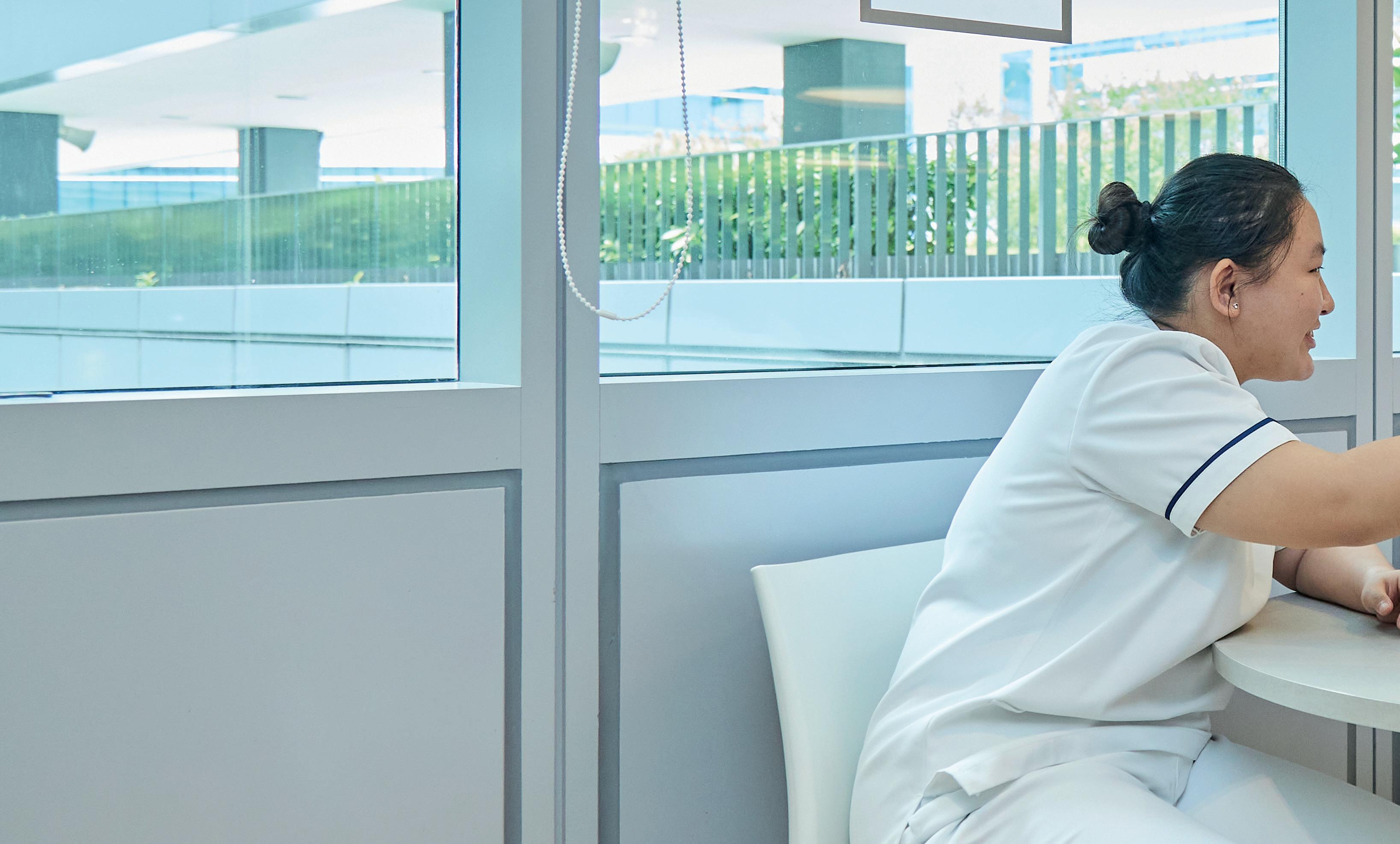
A Punithavathi Assistant Director, Medical Wards Changi General Hospital
Shaik Muhammad Hamzah (H): Can you tell us what inspired you to join nursing?
This story goes back more than 40 years, when my grandfather was hospitalised. My dad saw how patient, compassionate and dedicated the nurses were. After I completed my ‘O’ levels, he asked me: “Do you want to be a nurse?”
I agreed without hesitation, and here I am! Till today, I have no regrets — who I am as a nurse now is all thanks to my dad and his support.
The SingHealth Nursing Student Council is all about supporting nursing students. As a bridge between senior management and fellow students, we are here to advocate for your needs, help you grow professionally, and connect you with opportunities in the healthcare field. From organising skill-building events to representing the nursing body’s interests at higher levels, we are dedicated to making your journey as a nursing student in SingHealth as smooth and rewarding as possible.
To find out what the council has been up to, follow us on Instagram: @shn.trailblazers
Sumana Liew (S): Do you still remember your first day in nursing?
I’ll always remember the date of my first day in nursing school: 4 May 1983! I recall being very excited, but also slightly fearful of the unknown. Thankfully, my fun classmates and teachers made me feel at ease.
H: What’s your typical workday like?
I oversee the medical wards. Each day is fast-paced and multi-faceted. No two days are the same, and that’s what continues to motivate me as a nurse. Some of the things I do include reviewing patient status, staff deployment, and looking into any incidences that have occurred in each shift with my colleagues. I also make rounds to catch up with nurses, checking in on operational matters and patient care plans.
S: Wow, Sister! How do you keep going through such a busy day?
My kopi-o gao (extra strong black coffee)! It’s what keeps me going in my shift. In all honesty, the encouragement and support I receive from my colleagues each day is part of what spurs me on. I’m also motivated when I observe the recovery of my patients and see them improve day by day.
H: What was a recent interesting project you worked on?
Have you heard of hyperkalaemia? It’s a condition in which a person has high levels of potassium. Insulin is usually prescribed to manage the condition. To reduce the risk of administering the wrong insulin dosage, I worked closely with colleagues from the nursing, pharmacy and innovation teams to develop a device called Insulin Guard. It was very rewarding to see how Insulin Guard evolved from an idea into a solution that’s now in use in Changi General Hospital (CGH).
S: So what do you usually do on your days off?
I love watching actions and thrillers. Some of my all-time favourites are Chicago Fire and Law & Order: SVU . I also enjoy spending time with my pet beagle, Zeus. It is important to find personal time to rest and recover too.
H: What do you enjoy most about working here?
At CGH, we work closely with colleagues from various disciplines to provide care for our patients. I enjoy working in this collaborative environment; it helps in my professional growth. The Insulin Guard project I shared earlier is one example of the multidisciplinary collaboration that often takes place here.
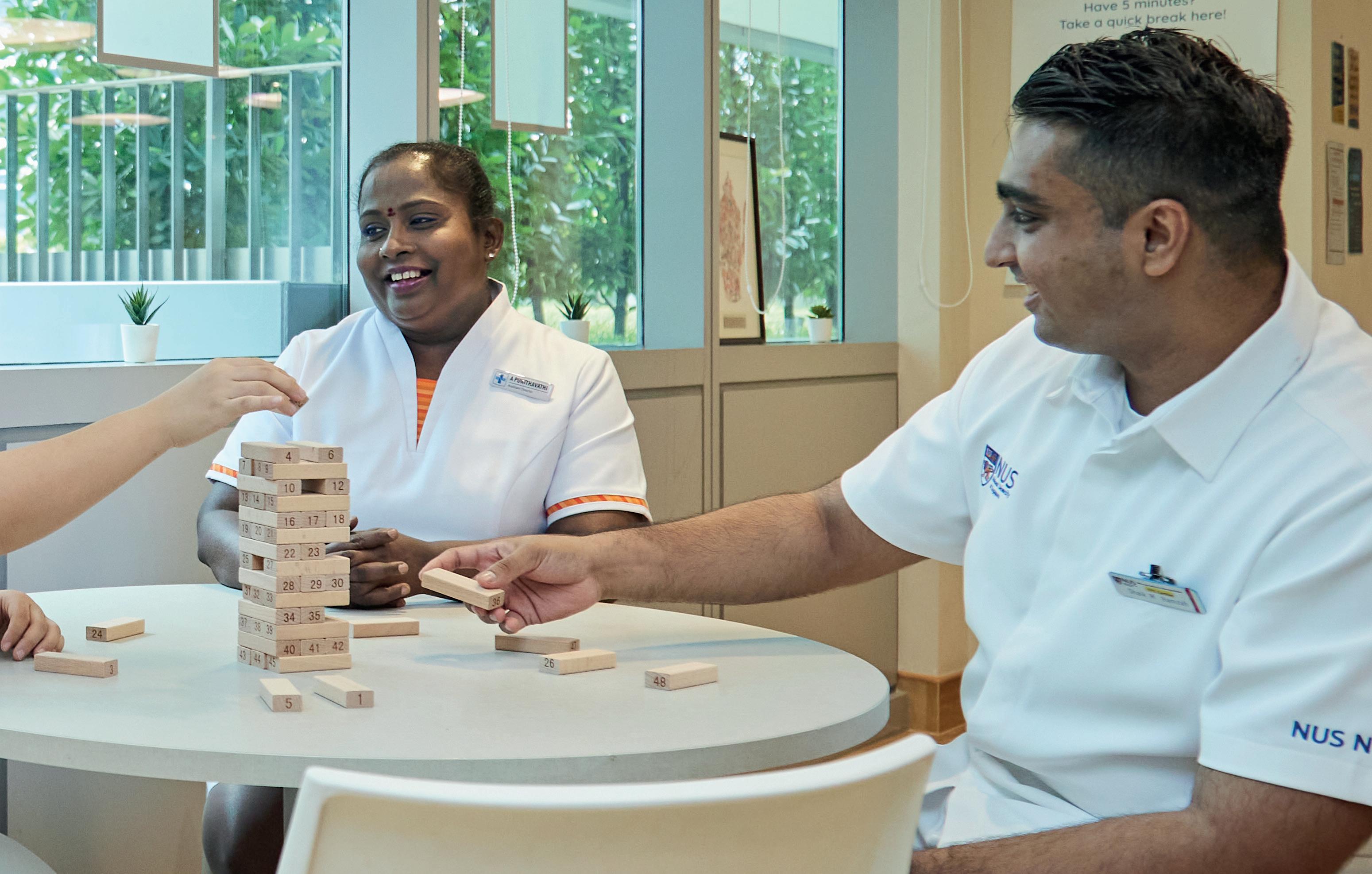
S: Could you share with us an anecdote of when you were especially proud to be a nurse?
Yes! In fact, it happened on my first day of work. I had to perform an emergency cardiopulmonary resuscitation (CPR) on a patient the moment I entered the ward at 8am. I was scared and excited at the same time. We managed to save the patient, and he was later discharged to go home. It was my first day, and my first save — I will never forget that feeling!
H: Over the years, did you have any mentors whom you admired?
I’ve had many wonderful mentors who have inspired and guided me in my 40-year career. I am thankful for the support system that I’ve had in CGH. One person who made a significant impact was the late Ms Ang Beng Choo, our former Chief Nursing Officer. She was caring, sincere and nurturing, and was always there to guide me during challenging moments. More importantly, she was a dear friend when I needed advice and support. I really miss her!
S: Looking back, what advice would you have given to your younger self?
Never stop learning, and never stop seeking opportunities for growth. I’d remind myself to stay curious, open-minded, and always be ready to adapt to change.
Sumana Liew (Chairperson) With a name that means ‘wisdom’ in Sanskrit, Sumana is a Year 3 student of the Singapore Institute of Technology and attached to train at the National Heart Centre Singapore.
I hope everyone will see nursing as a highly valued job, and not just the handling of patients.
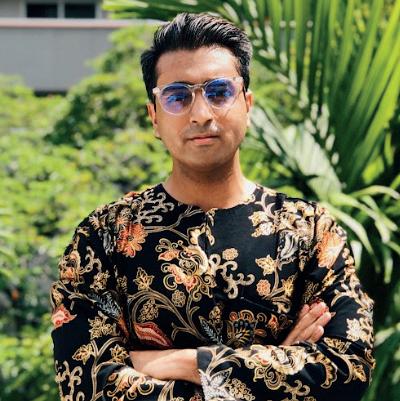

Shaik Muhammad Hamzah (Council Advisor) This Year 4 student of the National University of Singapore is attached to Changi General Hospital for training. In his spare time, Hamzah likes to practise his DIY magic on old furniture to make them look brand-new.
I hope more see the nursing profession as firmly embracing creativity and innovation, as nurses are empowered to explore new ideas, implement groundbreaking technologies, and develop inventive solutions to meet the evolving needs of patients and our healthcare system.
H: What about advice for future generations of nurses like Sumana and me?
Nursing can be emotionally and physically demanding. Yet, seeing the difference it makes to our patients’ lives makes it all worth it. My advice is for
you to cultivate resilience and to look after yourselves. Taking care of yourself allows you to better care for others. Remember, nursing is a journey. Each step, no matter how challenging, is an opportunity to learn and grow. The future is in your hands — take hold of it.

On this Nurses’ Day, we celebrate you, our very own heroes, who are on a quest to define tomorrow’s medicine! You face every challenge with courage and heart, shaping the future of care with your hands and hearts. You are the pride of SingHealth, making a difference to our patients, our colleagues in SingHealth, and beyond.
Happy Nurses’ Day!
Ng Wai Hoe Group CEO, SingHealth
Nurses, you are the heart and soul of healthcare. You balance professionalism with compassion, and bring patients and their families much needed care, hope and comfort on their healthcare journeys. Your dedication is appreciated beyond measure. Thank you and Happy Nurses’ Day!
Lim Soon Thye
Deputy Group CEO (Research, Education & Innovation), SingHealth;
CEO, National Cancer Centre Singapore
Kudos to our nurses for being A-star role models who embody Adaptability in a fast-evolving healthcare landscape, Agility in embracing innovation to transform care, Anti-fragility in the face of challenges and adversities, and Authenticity in placing people at the heart of everything you do. Thank you for being our agents of change, leading us towards new frontiers of care. You make a wonderful difference in all our lives.
Alex Sia CEO, KK Women’s and Children’s Hospital
Dear Nurses, your dedication, compassion and resilience inspire us all. Your commitment to providing exceptional care to our patients is truly remarkable. Thank you for your selflessness and the countless lives you touch with your kindness and expertise. You are the heart of our healthcare family, and we are deeply grateful for all that you do. Thank you for your hard work!
Aung Tin
CEO,
Singapore National Eye Centre
Nurses, we celebrate you! You have touched countless lives and brought comfort to patients in their moments of need. Nursing is a calling rooted in excellence, compassion and empathy, and you have truly lived up to your calling with such flair and grace. You are indeed the pride of SingHealth!
Fong Kok Yong Deputy Group CEO (Medical & Clinical Services) SingHealth
To our nurses — the pillars of healthcare — I extend my deepest admiration for your unwavering dedication and boundless empathy for patients, and your relentless pursuit of excellence. From patient care to pioneering research, your resilience and quiet resolve bring medicine to greater heights. On this Nurses’ Day, we salute your invaluable contributions to SingHealth.
Terrance Chua
Group Chairman, Medical Board, SingHealth
Our nurses are the pride and backbone of our healthcare system. My heartfelt appreciation for your dedication, compassion and hard work. Thank you for the immense contributions you bring to our patients and to all of us.
Happy Nurses’ Day!
Goh Bee Tin
CEO, National Dental Centre Singapore
Someone once said, ‘Nurses dispense comfort, compassion and care without even a prescription.’ How true! There is so much demanded of our nurses today, with the scope expanding to encompass education, innovation, research and more. While the going may get tough, you never forget the ‘why’ of this noble profession. Thank you for giving so many patients a reason to smile. Happy Nurses’ Day!
Gan Wee Hoe CEO, SingHealth Community Hospitals
We do not say it often enough but we appreciate you tremendously. Your expert care, passion and dedication to your profession inspire and remind us daily to be the best versions of ourselves. Although Nurses’ Day comes around only once a year, we are grateful for you every single day. Thank you so much for all that you do. Happy Nurses’ Day!
Kenneth Kwek
Deputy Group CEO (Digital Health), SingHealth; CEO, Singapore General Hospital
Nurses are the lifeblood of our healthcare system. Kudos to all your passion, commitment, dedication and compassion to always do right and do better for our patients and their families in your noble calling. Thank you for all your hard work and selflessness, through seasons thick and thin, working to care for our patients as one SingHealth family.
Ng Kee Chong
CEO, Changi General Hospital
Nurses are the bedrock of our healthcare family. It takes a special kind of person to take on this profession, which is incredibly demanding, both physically and emotionally. I’m honoured to be working alongside many of these extraordinary individuals who have dedicated their lives to serving others. They are the real heroes of our community. From the depths of my heart, THANK YOU!
Happy Nurses’ Day!
Yeo Khung Keong CEO, National Heart Centre Singapore
From all of us to each of you! Every day you touch and improve our patients’ lives through your dedication, care and compassion. I am truly grateful for your commitment in fostering a Healthier Singapore. Thank you for your selfless contributions to our patients’ and community’s well-being! Wishing our angels in white a Happy Nurses’ Day!
David Ng
CEO, SingHealth Polyclinics
A big ‘thank you’ to our angels in white who care for us when we are blue and nurse us back to the pink of health. Guided by a common purpose, your rich and diverse backgrounds and capabilities bring healing and hope to our patients in our institutions, community and beyond.
Lee Chien Earn
Deputy Group CEO (Regional Health System), SingHealth
Nurses, your selflessness knows no bounds as you tirelessly ensure the well-being of others, often at the sacrifice of your own. Your dedication uplifts our healthcare community, patients, and their families every day. For that, we are grateful. Thank you for being our awesome rock stars! Happy Nurses’ Day!
Teo Eng Kiong
CEO, Sengkang General Hospital
Nurses, thank you for your dedication and commitment, for always going above and beyond to provide outstanding and compassionate care to our patients and their families. Your contribution to education, innovation and academic medicine is truly admirable, and a great inspiration to many of us. You are the pride of NNI and SingHealth. Wishing you a Happy Nurses’ Day!
Au Wing Lok
CEO, National Neuroscience Institute
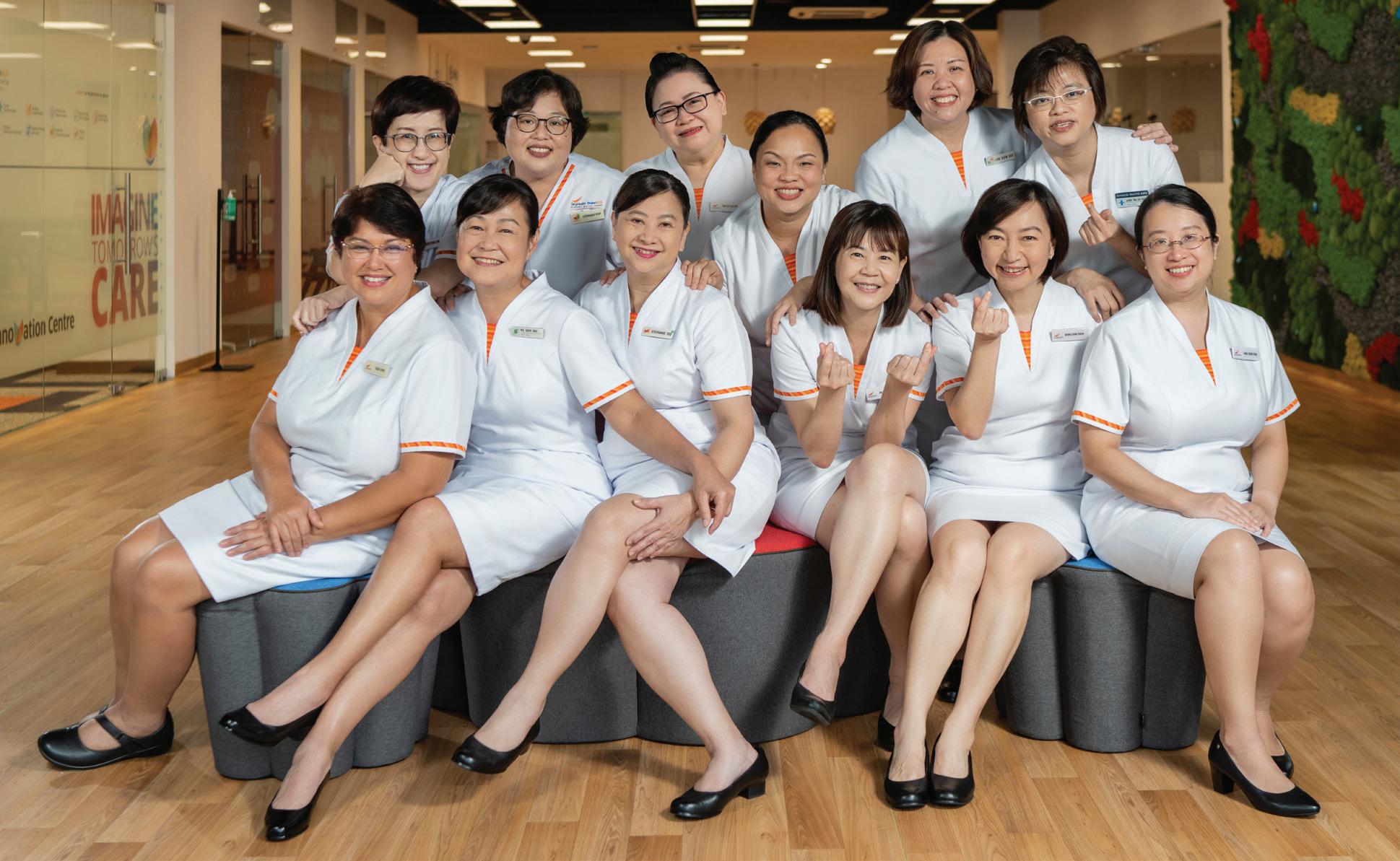
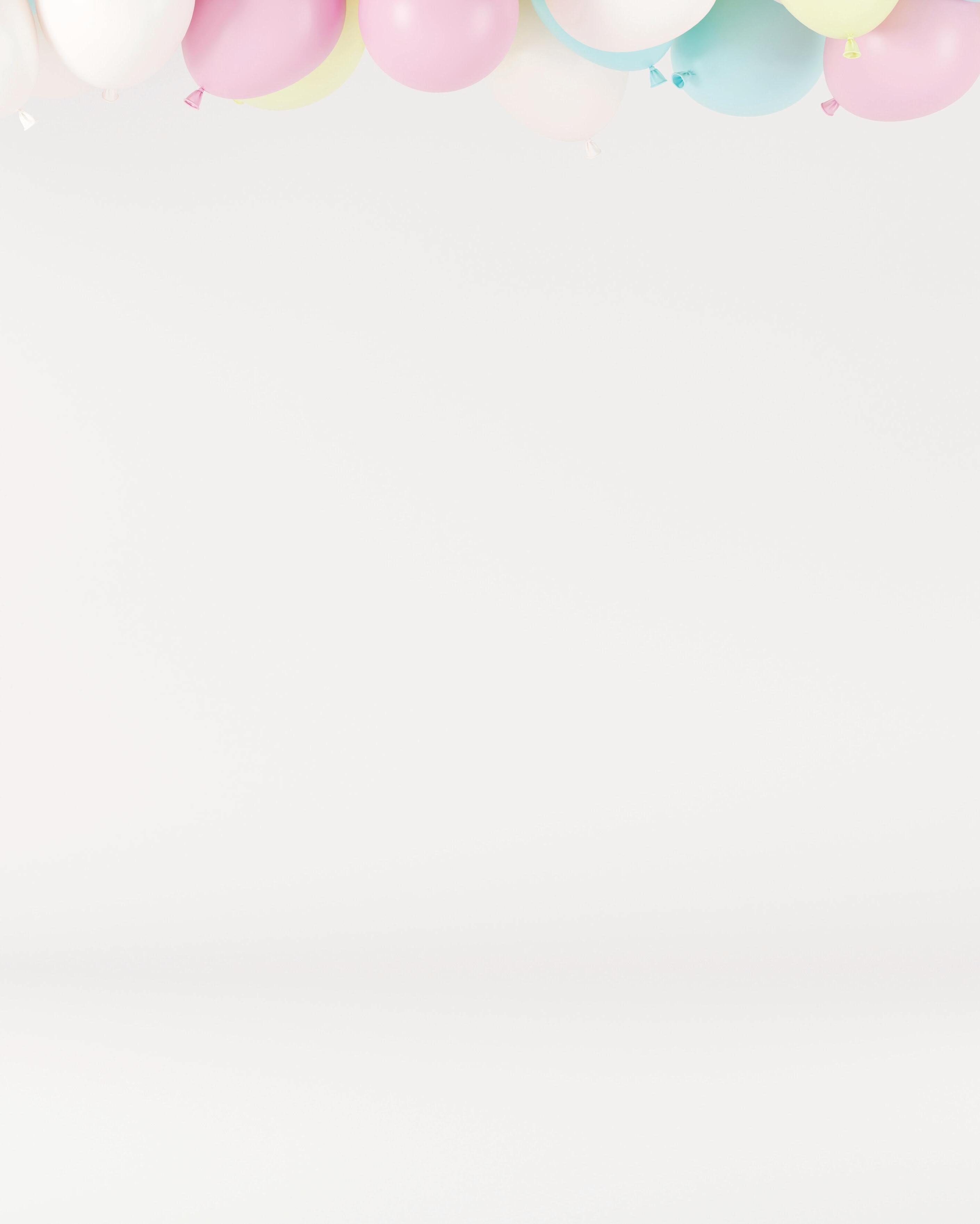
Tracy Carol Ayre
Our dearest Nurses, Happy Nurses’ Day! We celebrate you, the pride of SingHealth, and your crucial role in shaping the future of nursing. Your dedication inspires us all. Thank you for your commitment and for being the heart of healthcare.
Group Chief Nurse, SingHealth
Stephanie Teo
Deputy Group Chief Nurse (Care Integration & Community Nursing), SingHealth; Director, Community Nursing, SingHealth Office of Regional Health; Chief Nurse, SingHealth Polyclinics
Wong Sook Thow
Deputy Group Chief Nurse (Nursing Transformation), SingHealth; Chief Nurse, KK Women’s and Children’s Hospital
Lian Siew Bee Director, Nursing, National Cancer Centre Singapore
Ang Shin Yuh Director, Nursing, National Dental Centre Singapore
Loh Huey Peng Director, Nursing, Singapore National Eye Centre
Ng Gaik Nai
Deputy Group Chief Nurse (Nursing Education & Professional Development), SingHealth; Chief Nurse, Singapore General Hospital
Christina Lim
Deputy Group Chief Nurse (Crisis Planning, Nursing Operations & Nursing Informatics), SingHealth; Chief Nurse, Sengkang General Hospital
Png Gek Kheng
Chief Nurse, Changi General Hospital
Amy Tay
Chief Nurse, National Heart Centre Singapore
Ng Wai May
Director, Nursing, National Neuroscience Institute
Stephanie Yeap
Chief Nurse, SingHealth Community Hospitals
Dear Nurses, Happy Nurses’ Day to all the incredible nurses out there! You continue to be the strong pillars of our healthcare system, delivering care with expertise, compassionate hearts, and skilled hands. Your unwavering commitment to care and courage to take on new challenges pave the way for a brighter future of nursing, where the work you do will shape a brighter and healthier future for us all. Thank you for all your invaluable contributions and achievements made!
Paulin Koh
Chief Nursing Officer, Ministry of Health
